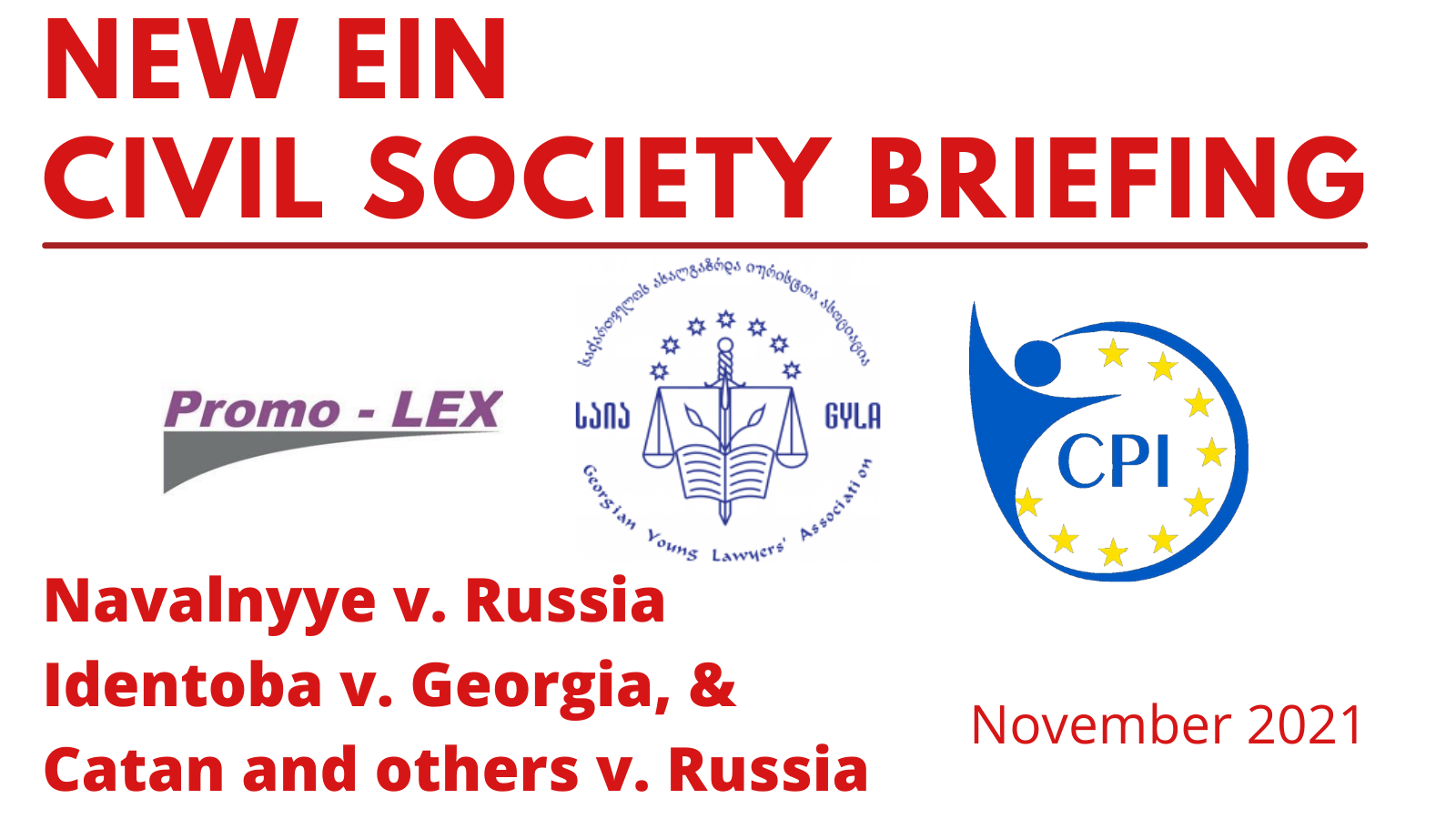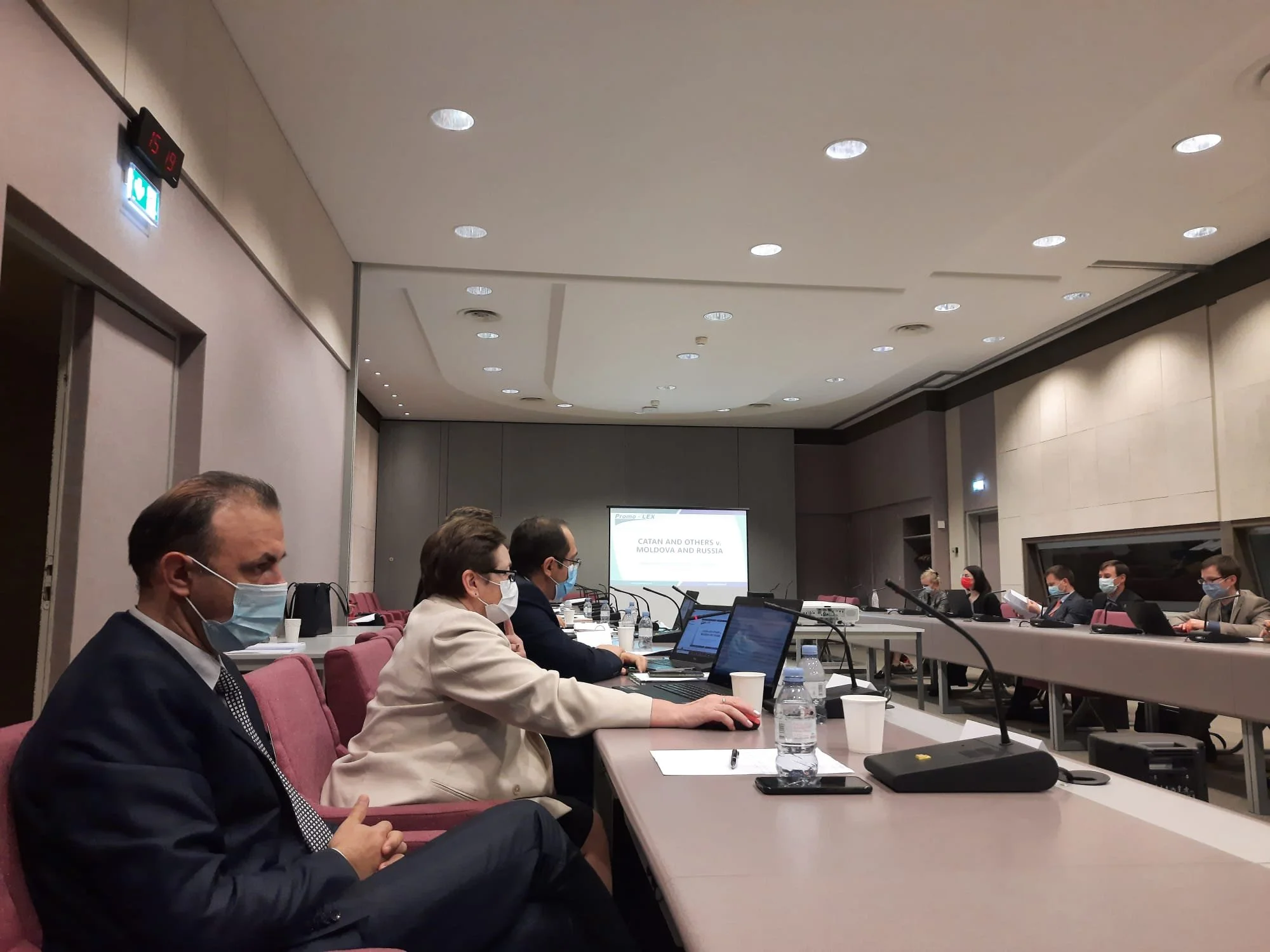EIN Civil Society Briefing November 2021: Navalnyye v. Russia, Identoba v. Georgia, and Catan and others v. Russia and liquidation of Memorial
/On 18 November 2021, EIN held a civil society briefing for Permanent Representatives of the Council of Europe, ahead of the Committee of Minister’s Human Rights Meeting on 30 November – 2 December 2021. The event was held in-person, the first in-person civil society briefing since the pandemic.
The Briefing focused on the following cases:
Navalnyye v Russian Federation, concerning criminal conviction based on an unfair trial and an arbitrary application of criminal law (violations of Articles 6 and 7), presented by Anna Maralyan from Centre de la Protection Internationale.
Identoba and others v Georgia, concerning the lack of protection against homophobic attacks during demonstrations, presented by Tamar Oniani, Head of the International Litigation Team, Georgian Young Lawyers Association (GYLA).
Catan and others v Russia, concerning violations of the rights of children, parents and staff members of Latin-script schools located in the Transnistrian region of the Republic of Moldova. This briefing was presented by Alexandru Postica and Ion Manole, from Promo-LEX, and Svetlana Jitariuc, a teacher and mother of two pupils - applicants in the case of Catan and others.
Statement on the liquidation of the NGOs International Memorial and Human Rights Centre Memorial by Dmitry Gurin, Senior Lawyer with Memorial Human Rights Centre (ECtHR litigation practice)
Navalnyye v Russian Federation
The Navalnyye case concerns the criminal conviction in 2014 of Mr Aleksey Navalny and his brother, Mr Oleg Navalnyy.
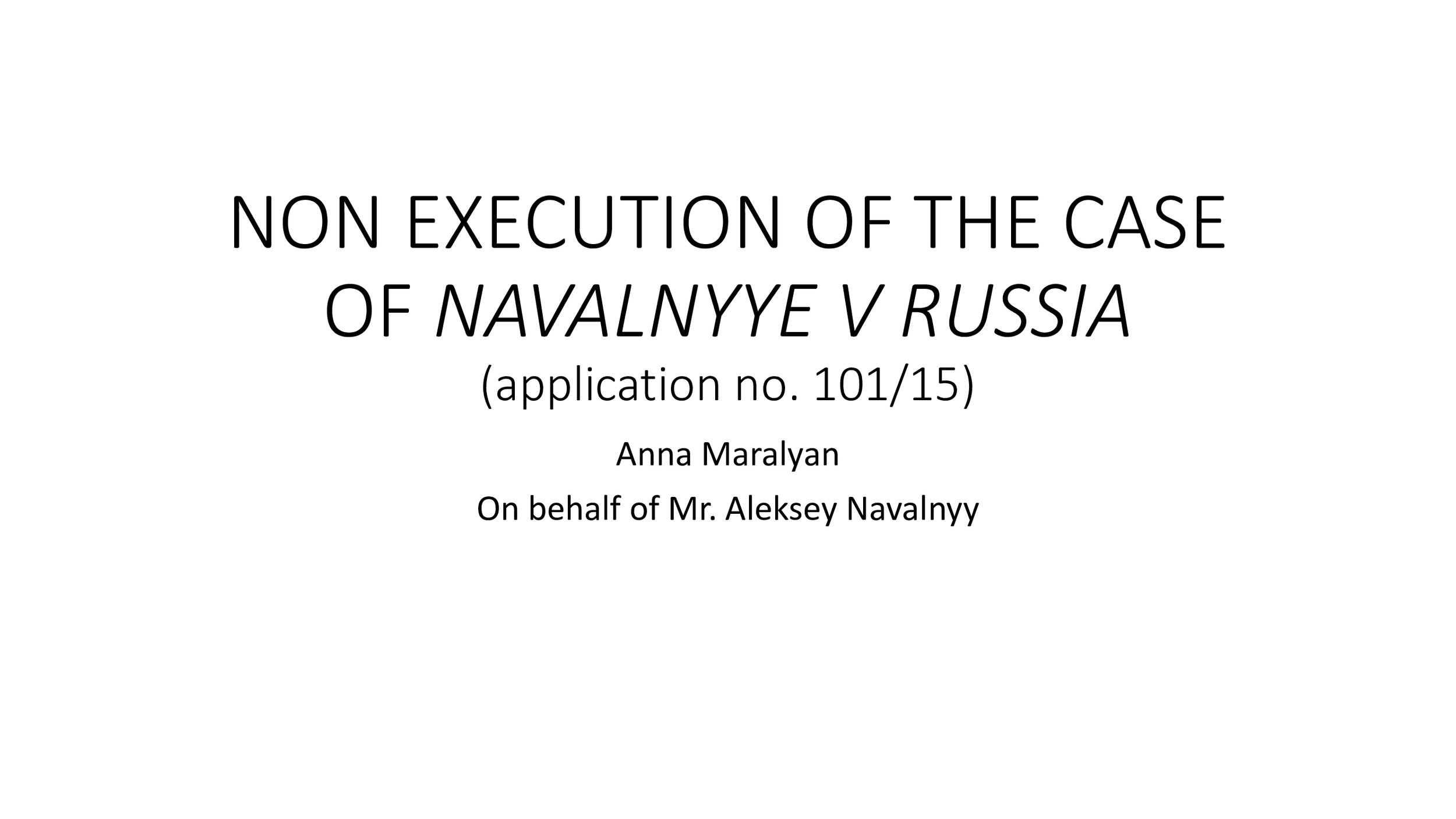
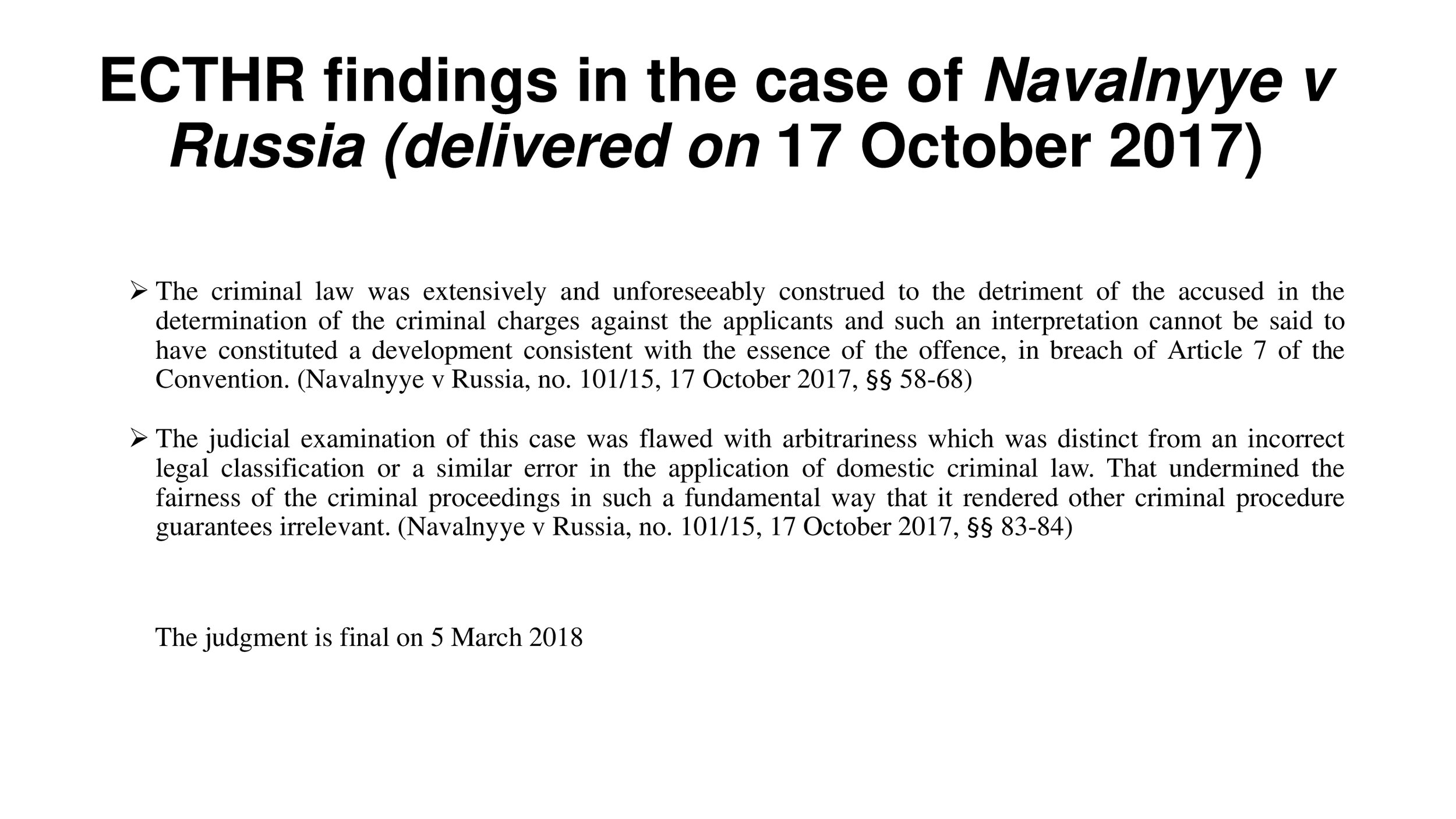
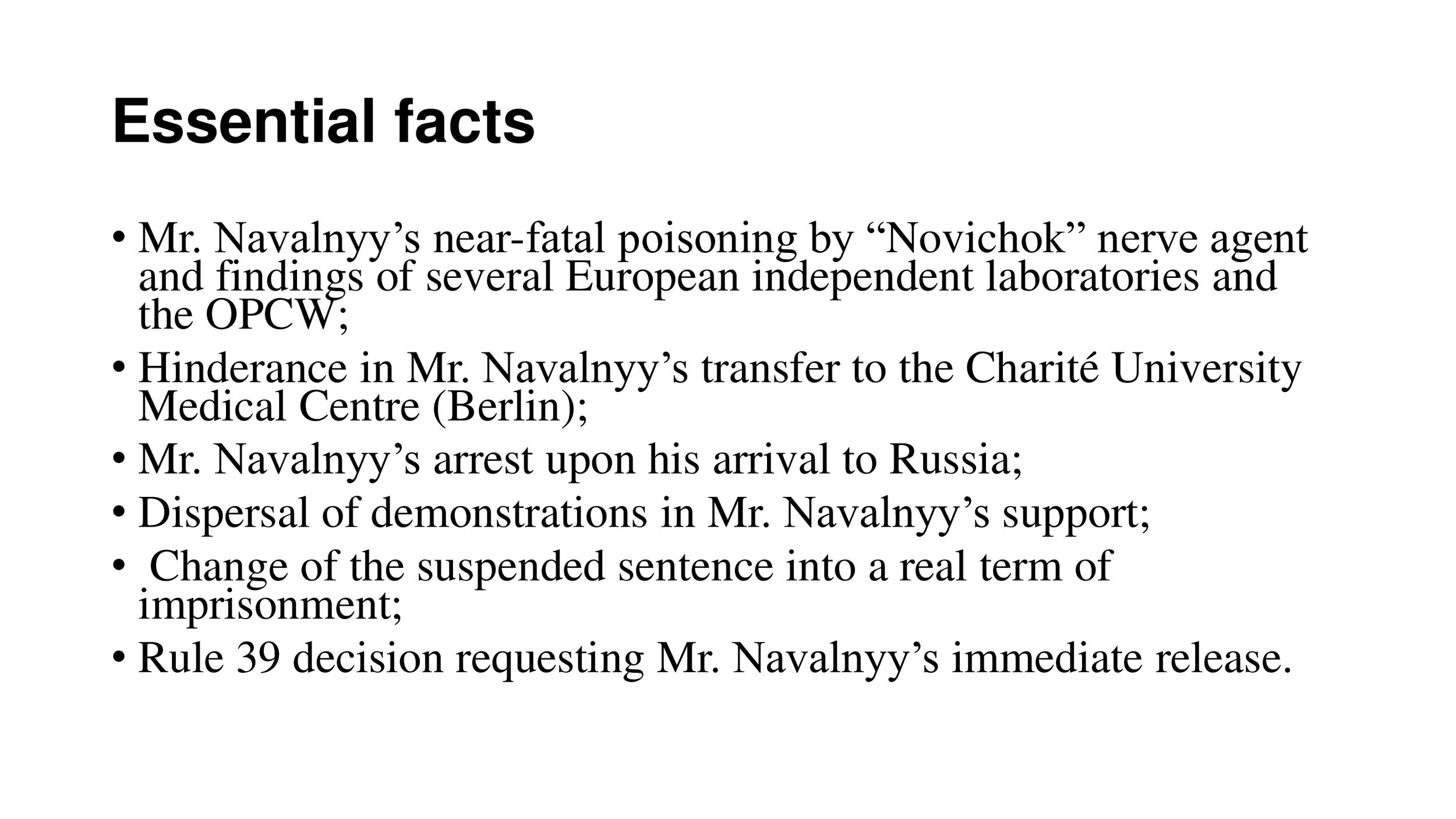
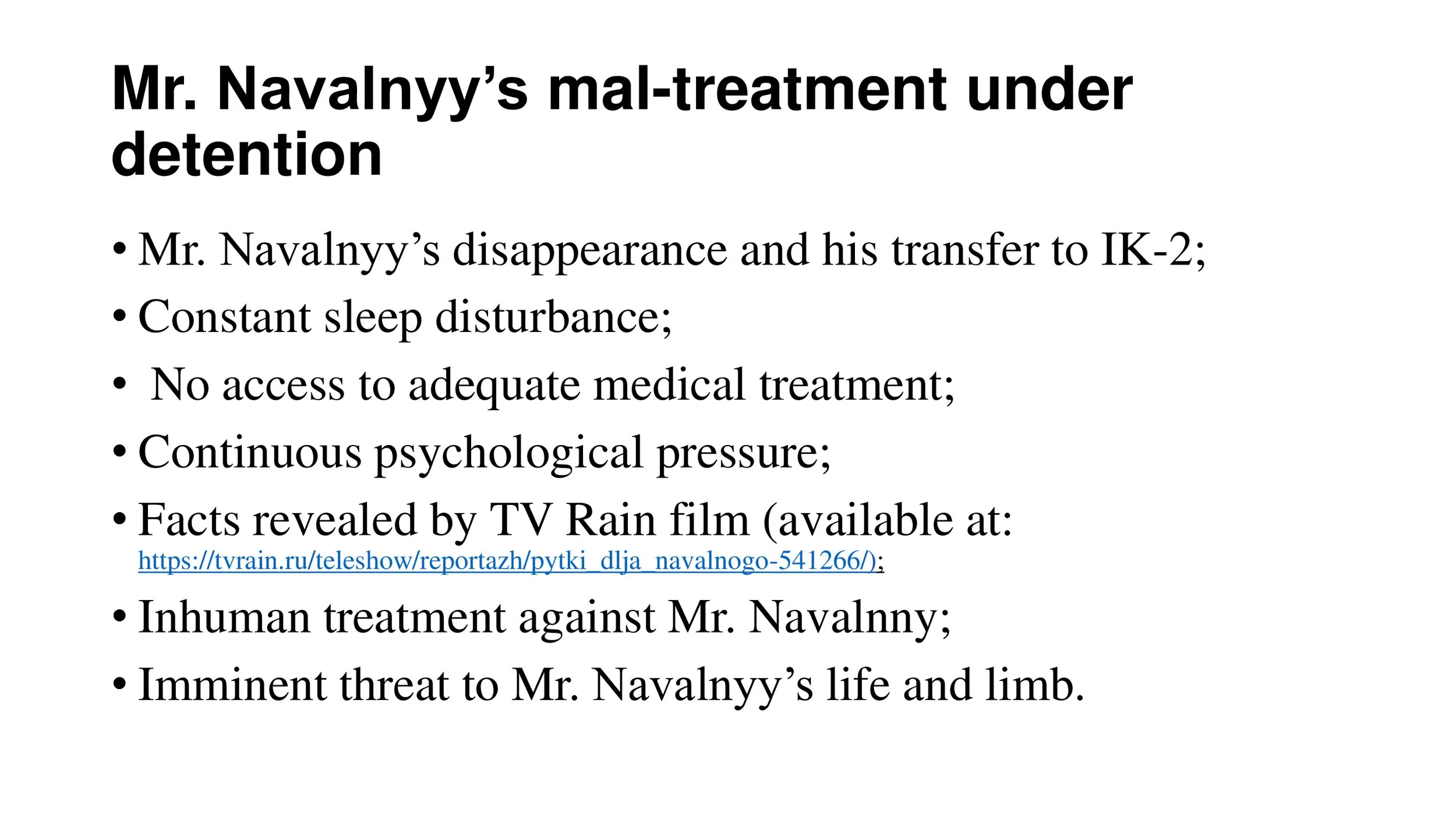
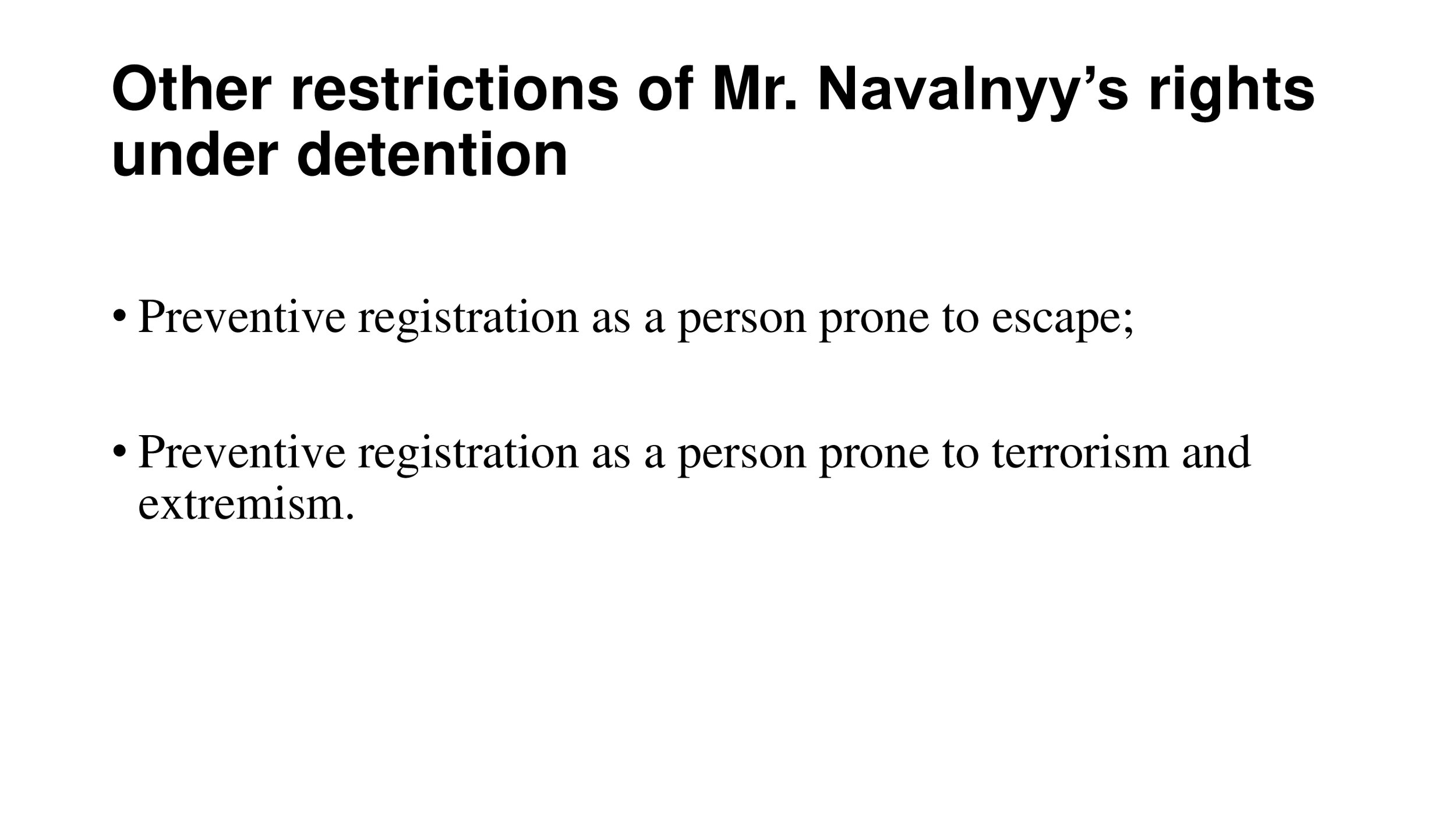
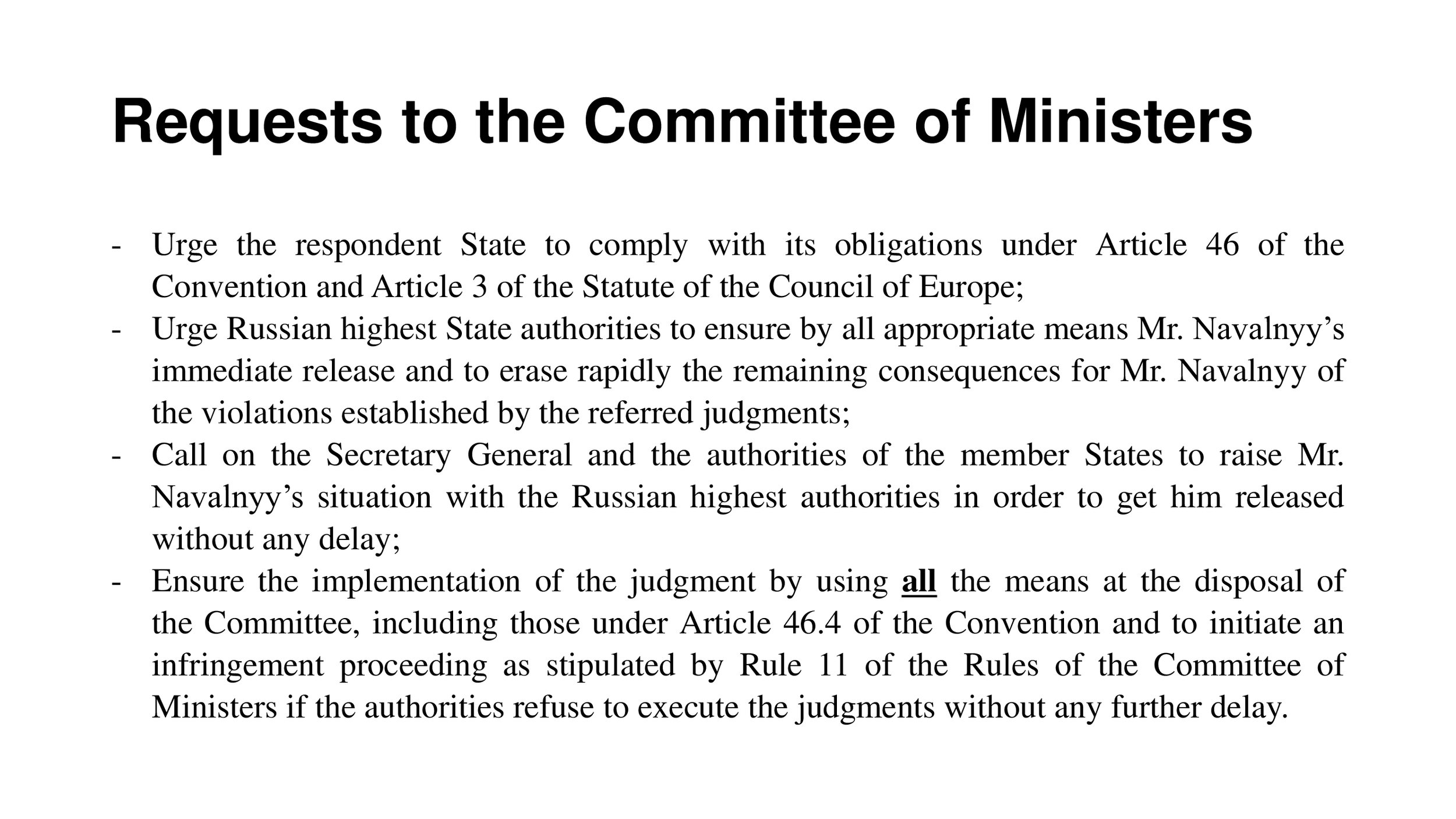
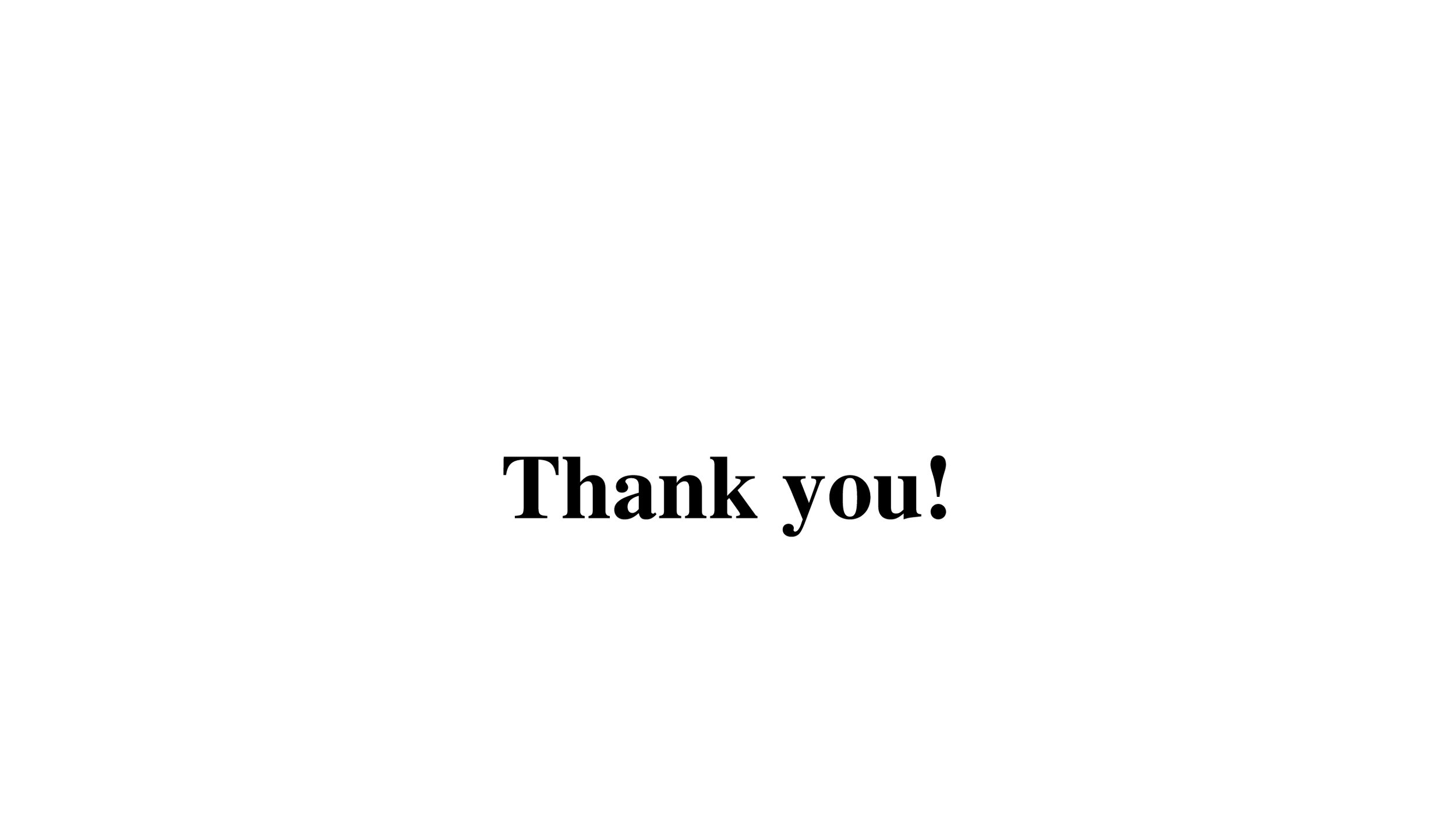
Overview of Briefing
The Centre de la Protection Internationale reminded participants of the European Court of Human Rights judgment in the case:
The criminal law was extensively and unforeseeably construed to the detriment of the accused in the determination of the criminal charges against the applicants and such an interpretation cannot be said to have constituted a development consistent with the essence of the offence, in breach of Article 7 of the Convention. (Navalnyye v Russia, no. 101/15, 17 October 2017, §§ 58-68)
The judicial examination of this case was flawed with arbitrariness which was distinct from an incorrect legal classification or a similar error in the application of domestic criminal law. That undermined the fairness of the criminal proceedings in such a fundamental way that it rendered other criminal procedure guarantees irrelevant. (Navalnyye v Russia, no. 101/15, 17 October 2017, §§ 83-84)
Image Credit: EIN
The Centre de la Protection Internationale reminded participants of essential facts of the case:
Mr. Navalnyy’s near-fatal poisoning by “Novichok” nerve agent and findings of several European independent laboratories and the OPCW;
Hindrance in Mr. Navalnyy’s transfer to the Charité University Medical Centre (Berlin);
Mr. Navalnyy’s arrest upon his arrival to Russia;
Dispersal of demonstrations in Mr. Navalnyy’s support;
Change of the suspended sentence into a real term of imprisonment;
Rule 39 decision requesting Mr. Navalnyy’s immediate release.
Mr. Navalnyy’s disappearance and his transfer to IK-2;
Constant sleep disturbance;
No access to adequate medical treatment and continuous psychological pressure;
Facts revealed by TV Rain film (available at: https://tvrain.ru/teleshow/reportazh/pytki_dlja_navalnogo-541266/);
Inhuman treatment against Mr. Navalnny and Imminent threat to Mr. Navalnyy’s life and limb.
Preventive registration as a person prone to escape and preventive registration as a person prone to terrorism and extremism.
The Centre de la Protection Internationale provided the following recommendations to the CM for authorities to:
Urge the respondent State to comply with its obligations under Article 46 of the Convention and Article 3 of the Statute of the Council of Europe;
Urge Russian highest State authorities to ensure by all appropriate means Mr. Navalnyy’s immediate release and to erase rapidly the remaining consequences for Mr. Navalnyy of the violations established by the referred judgments;
Call on the Secretary-General and the authorities of the member States to raise Mr. Navalnyy’s situation with the Russian highest authorities in order to get him released without any delay;
Ensure the implementation of the judgment by using all the means at the disposal of the Committee, including those under Article 46.4 of the Convention and to initiate an infringement proceeding as stipulated by Rule 11 of the Rules of the Committee of Ministers if the authorities refuse to execute the judgments without any further delay.
Please see the slides for the full Briefing.
Relevant Documents:
Rule 9.2 Submissions
CM Decisions
Rule 9.1 Submissions
Identoba and others v Georgia
These cases concern degrading treatment of the applicants on account of the abusive police conduct during a search of premises of an LGBT NGO motivated by homophobic and/or transphobic hatred (in 2009), the authorities’ failure to provide adequate protection against inhuman and degrading treatment inflicted by private individuals on LGBTI activists (in May 2012) and Jehovah’s Witnesses (in 1999-2001), who were violently attacked during marches/meetings, as well as the absence of effective investigations, including as regards discriminatory motives in that connection.
Overview of Briefing
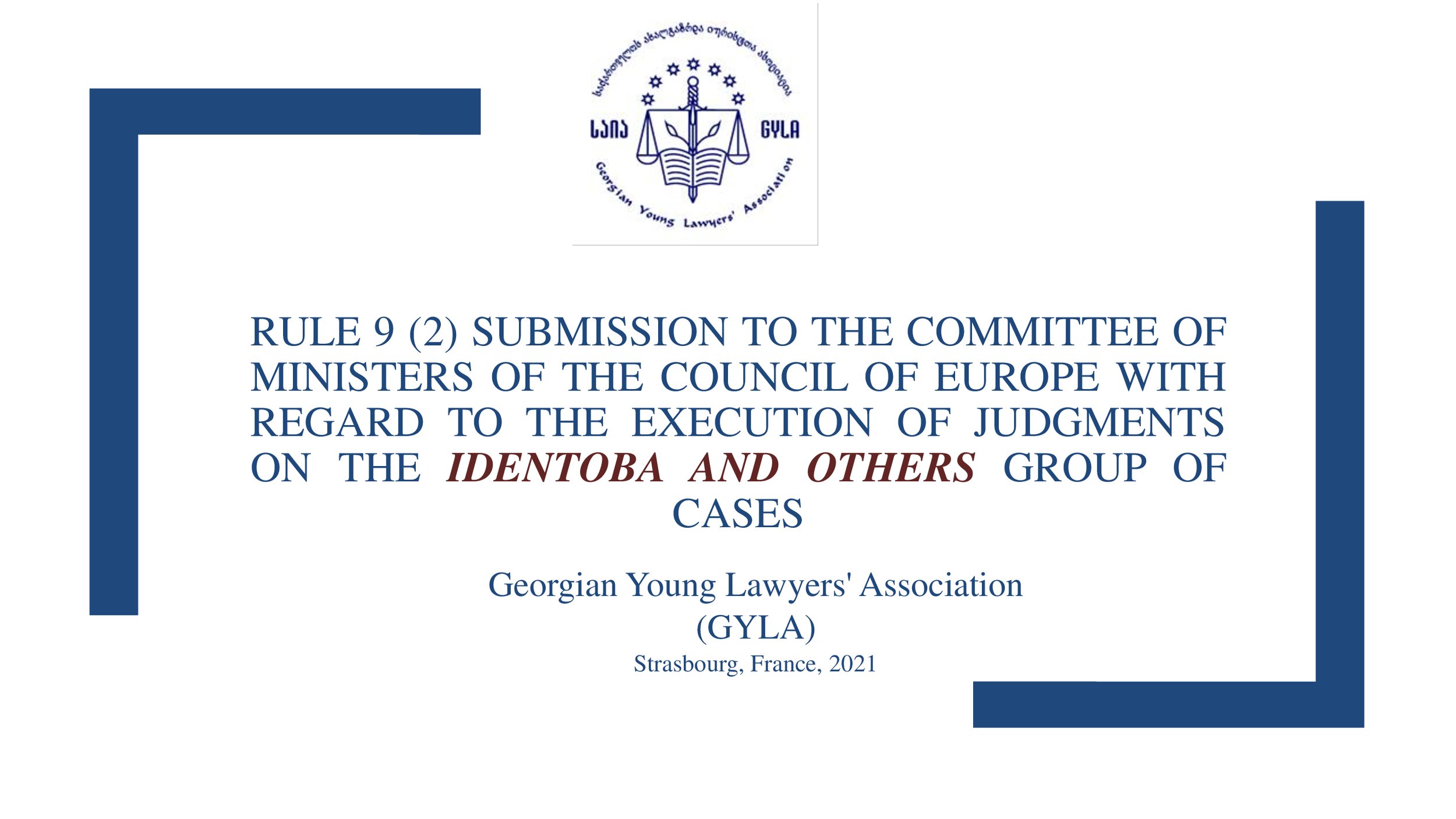
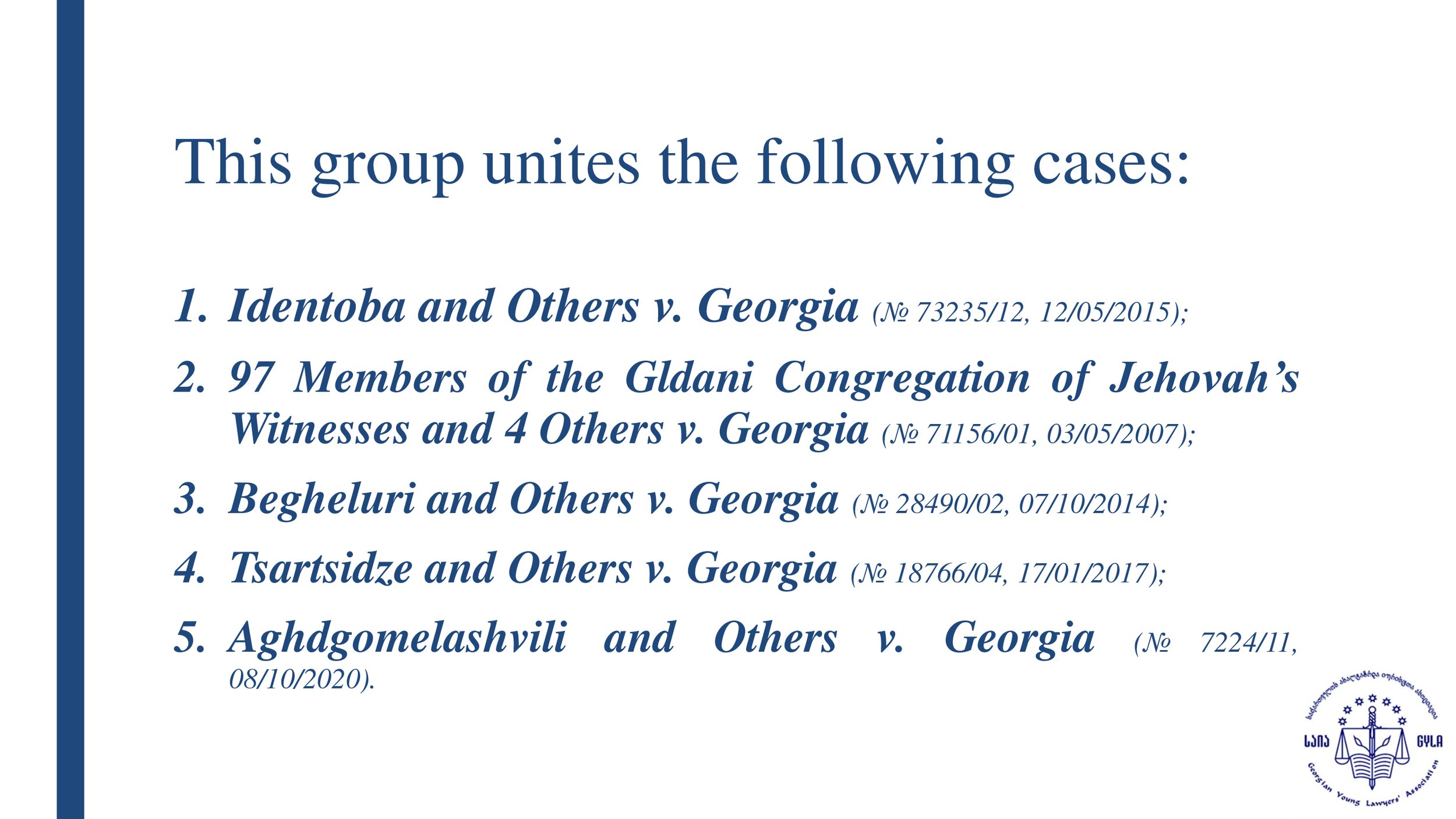
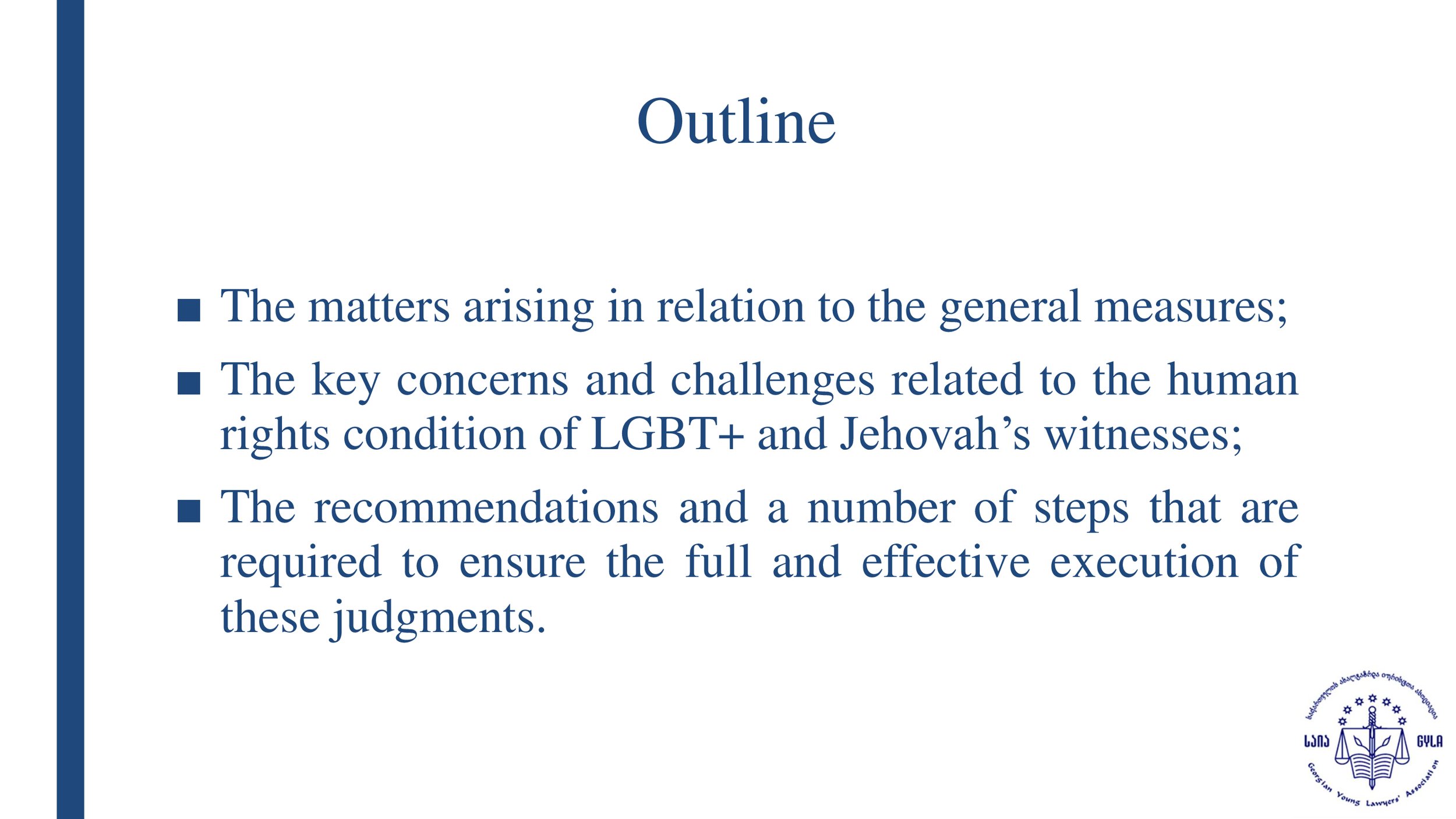
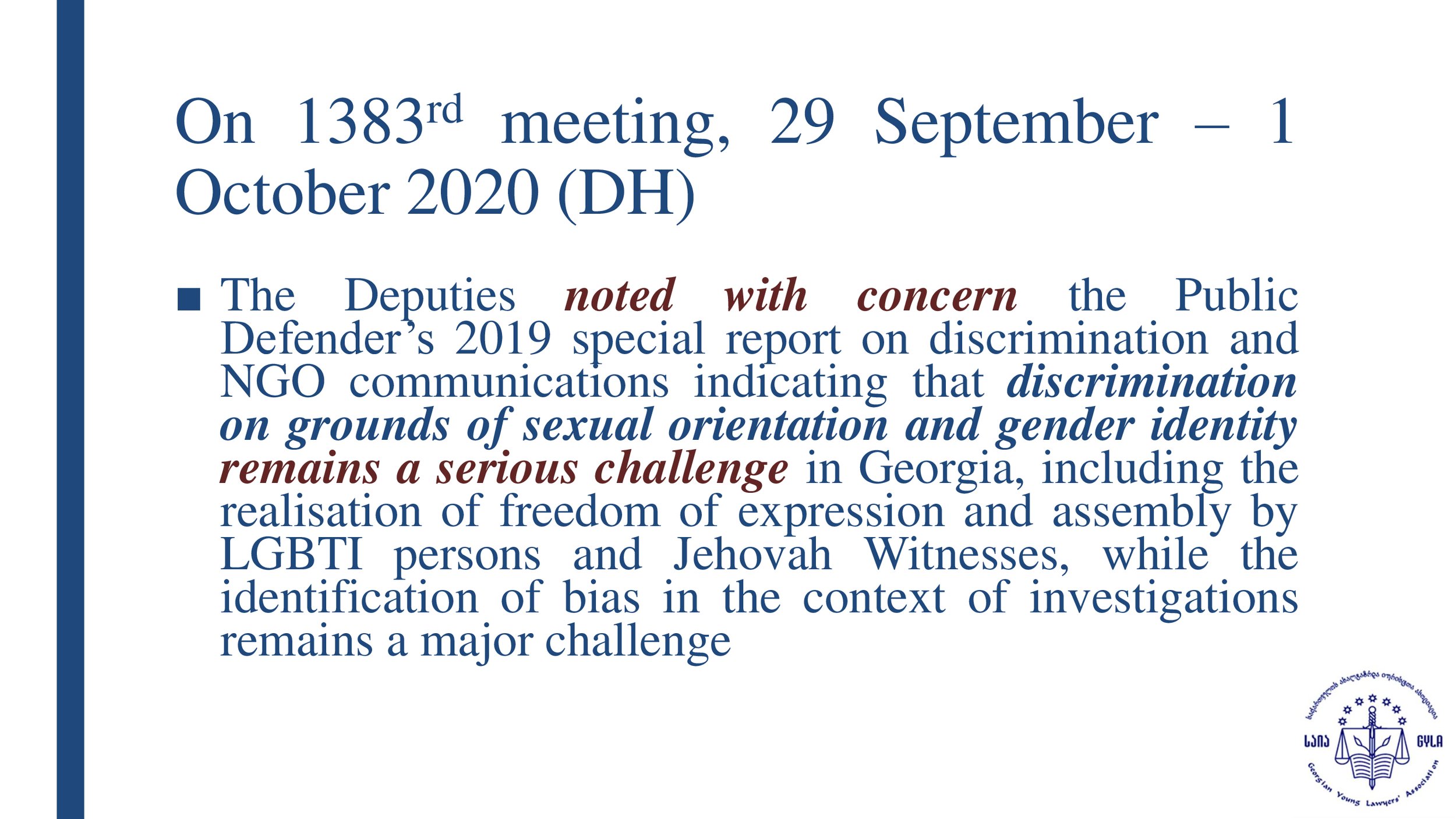
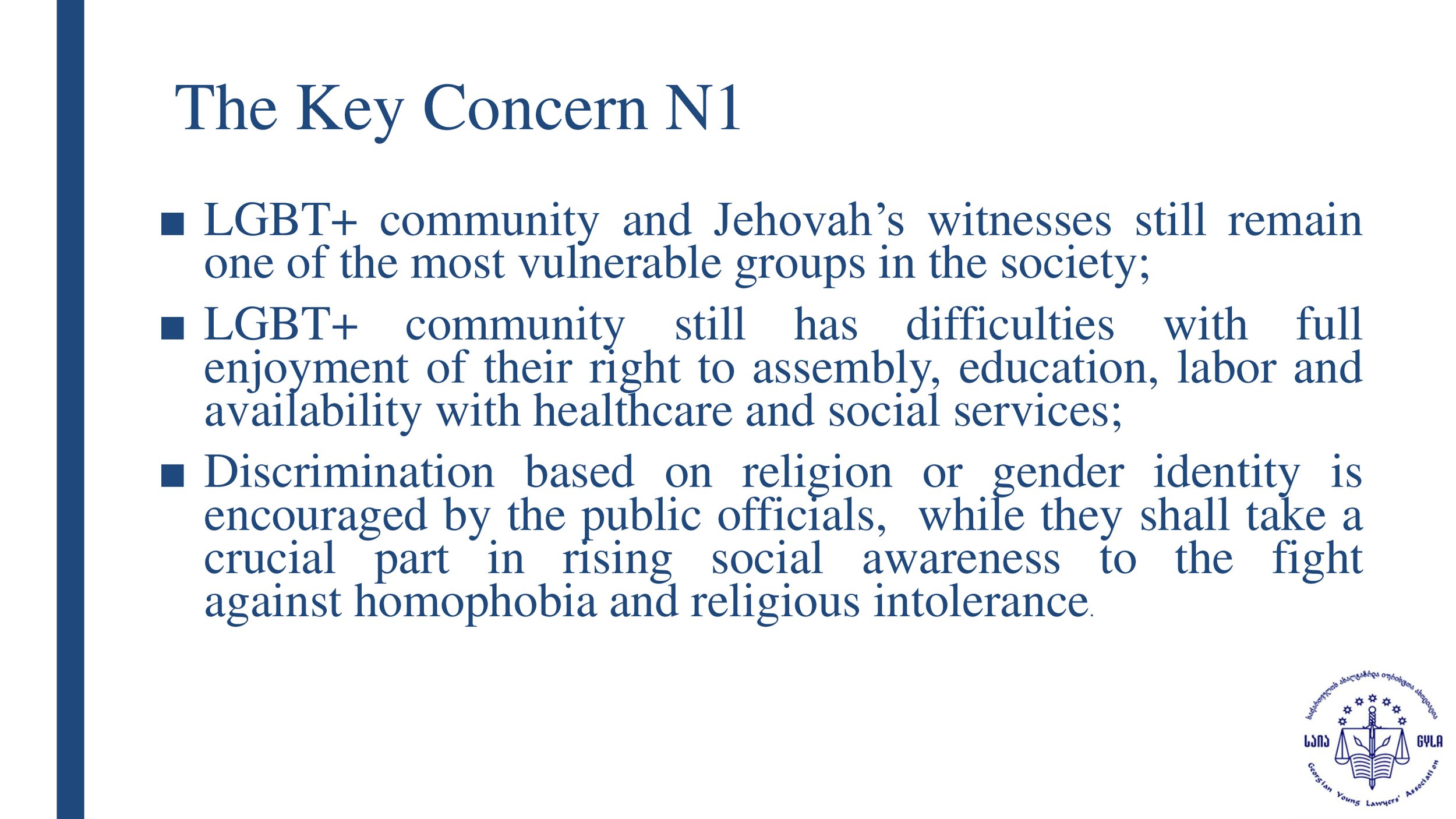
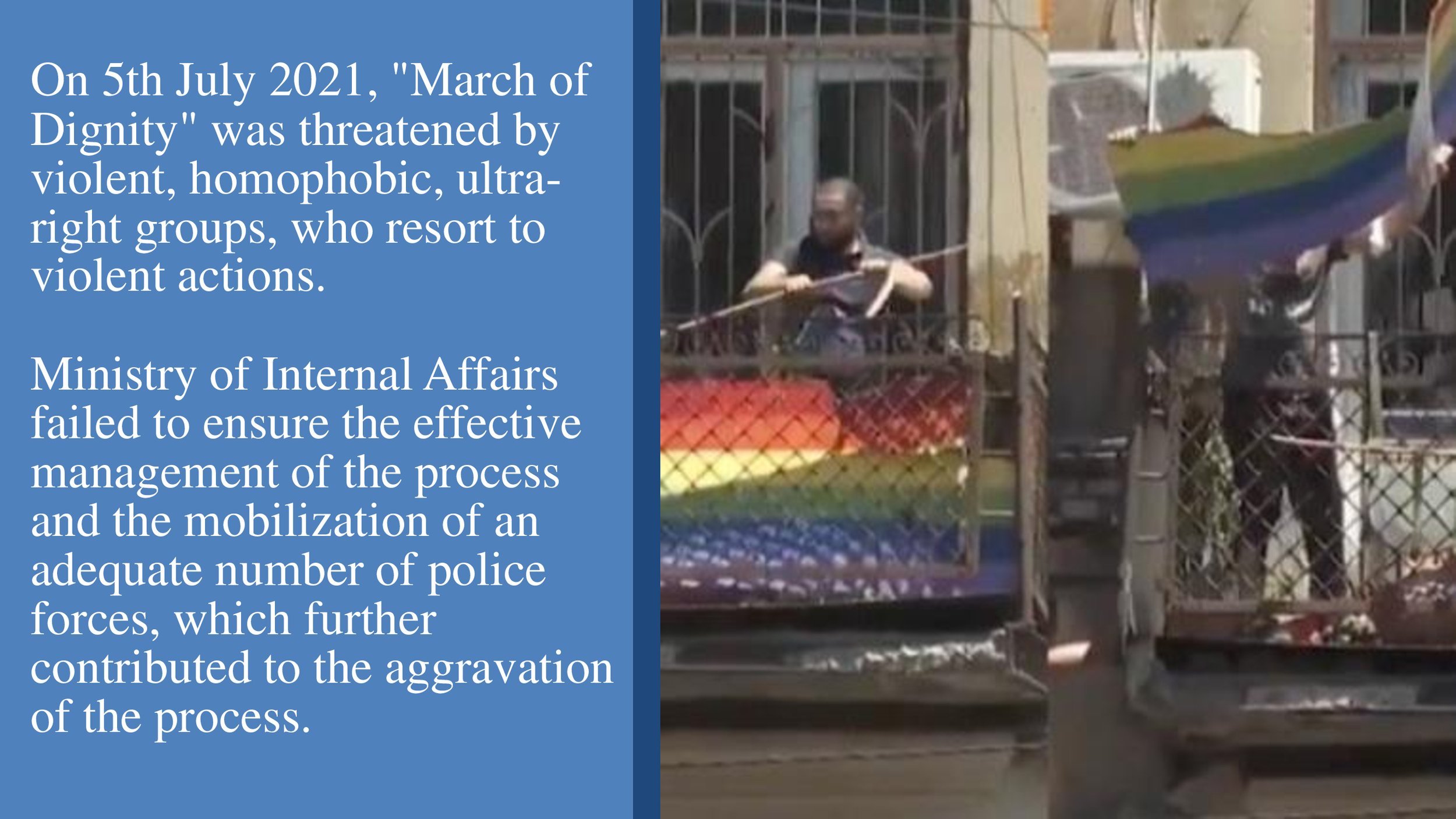
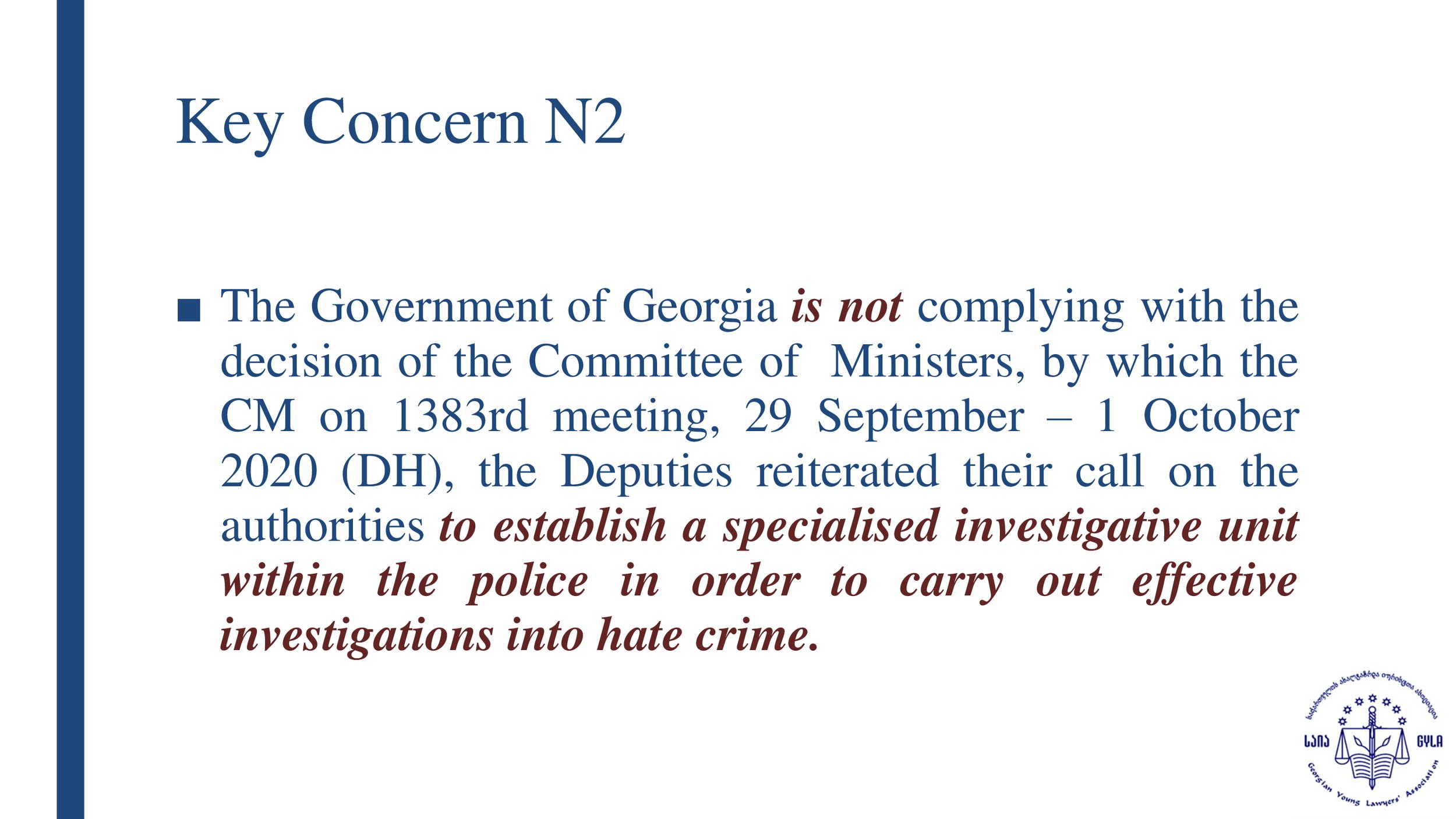
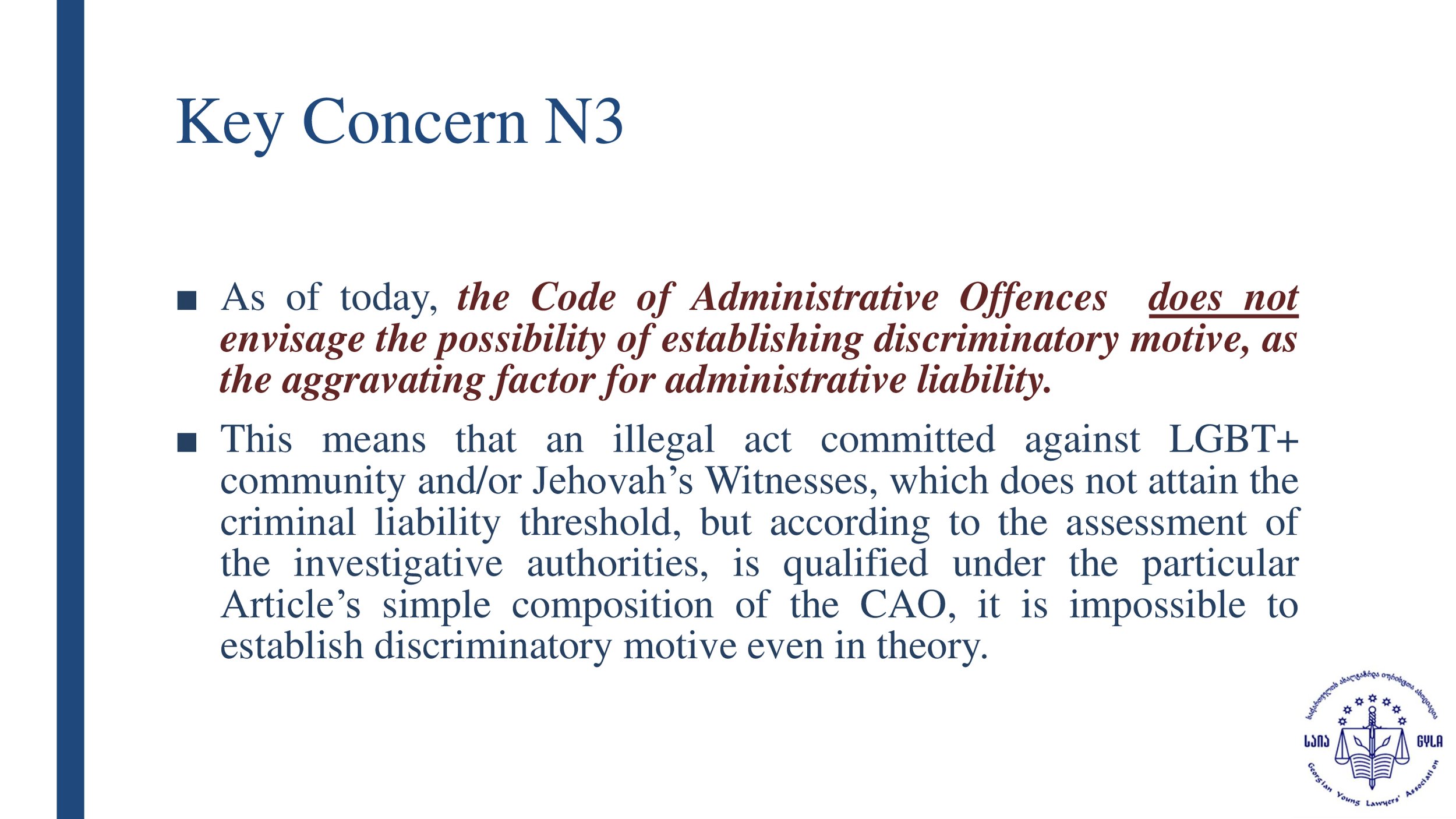
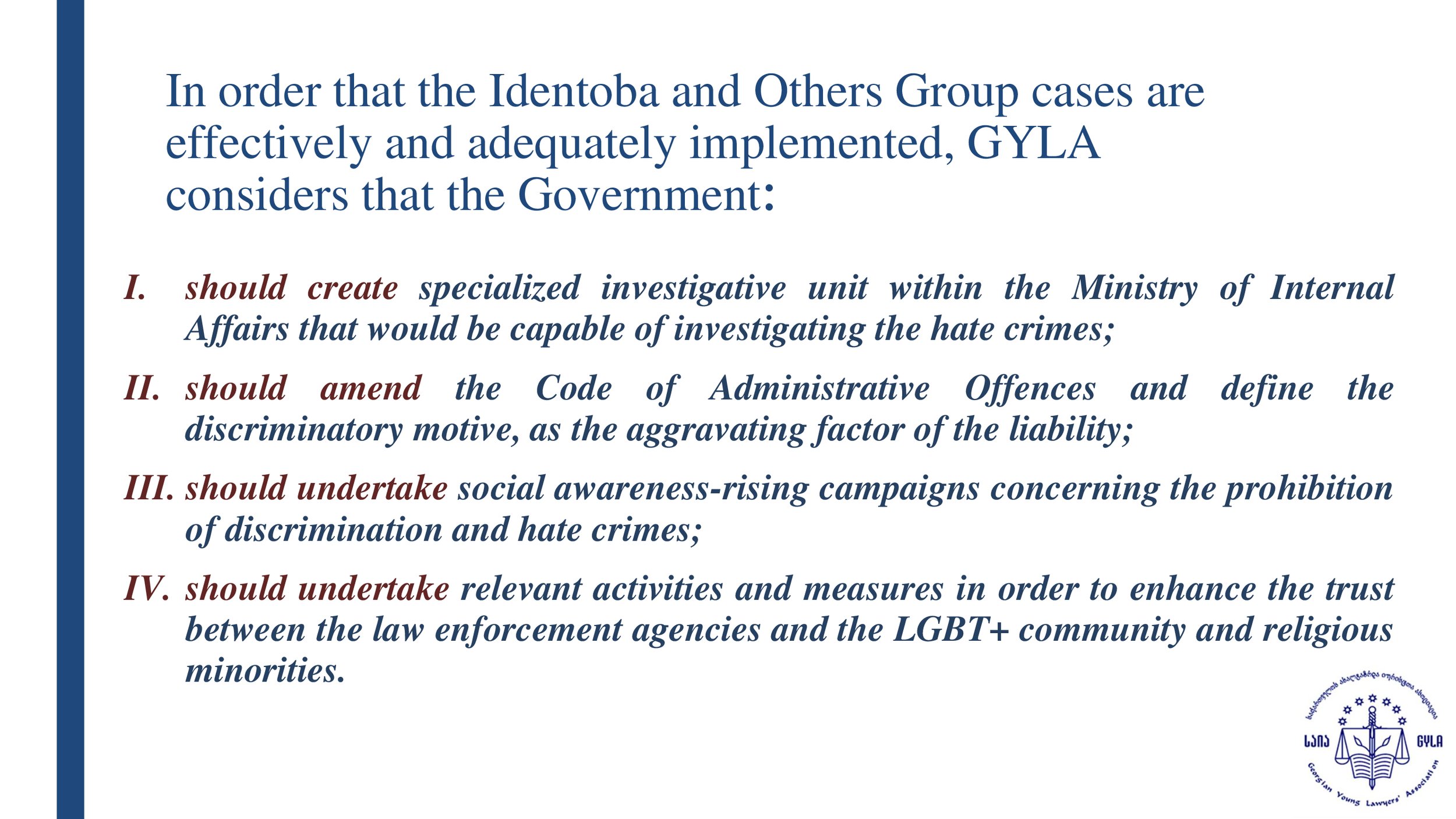

GYLA reminded participants of the latest CM decision regarding the case from 2020:
The Deputies noted with concern that discrimination on grounds of sexual orientation and gender identity remains a serious challenge in Georgia, referring to the Public Defender’s 2019 special report on discrimination and NGO communications.
The Deputies specifically acknowledged that this issue includes the realization of freedom of expression and assembly by LGBTI persons and Jehovah Witnesses, while the identification of bias in the context of investigations remains a major challenge
Image Credit: EIN
GYLA outlined the remaining key concerns:
LGBT+ community and Jehovah’s witnesses still remain one of the most vulnerable groups in society.
LGBT+ community still has difficulties with full enjoyment of their right to assembly, education, labor and availability with healthcare and social services;
Discrimination based on religion or gender identity is encouraged by the public officials, while they shall take a crucial part in raising social awareness to the fight against homophobia and religious intolerance.
The Government of Georgia is not complying with the decision of the Committee of Ministers, by which the CM on 1383rd meeting, 29 September – 1 October 2020 (DH), the Deputies reiterated their call on the authorities to establish a specialised investigative unit within the police to carry out effective investigations into hate crime.
As of today, the Code of Administrative Offences does not envisage the possibility of establishing discriminatory motive, as the aggravating factor for administrative liability.
This means that an illegal act committed against the LGBT+ community and/or Jehovah’s Witnesses, which does not attain the criminal liability threshold, but according to the assessment of the investigative authorities, is qualified under the particular Article’s simple composition of the CAO, it is impossible to establish discriminatory motive even in theory.
GYLA provided the following recommendations to the CM urging authorities to:
create a specialized investigative unit within the Ministry of Internal Affairs that would be capable of investigating the hate crimes;
amend the Code of Administrative Offences and define the discriminatory motive, as the aggravating factor of the liability;
undertake social awareness-raising campaigns concerning the prohibition of discrimination and hate crimes;
undertake relevant activities and measures in order to enhance the trust between the law enforcement agencies and the LGBT+ community and religious minorities.
Please see the slides for the full Briefing.
Relevant Documents:
Latest Rule 9.2 Submissions
CM Decisions
Catan and others v Russia
The cases in this group concern violations of the right to education of children and parents using Latin-script schools in the Transnistrian region of the Republic of Moldova.
Overview of Briefing
Promo-LEX reminded participants of the individual and general measures required for the case to be implemented:
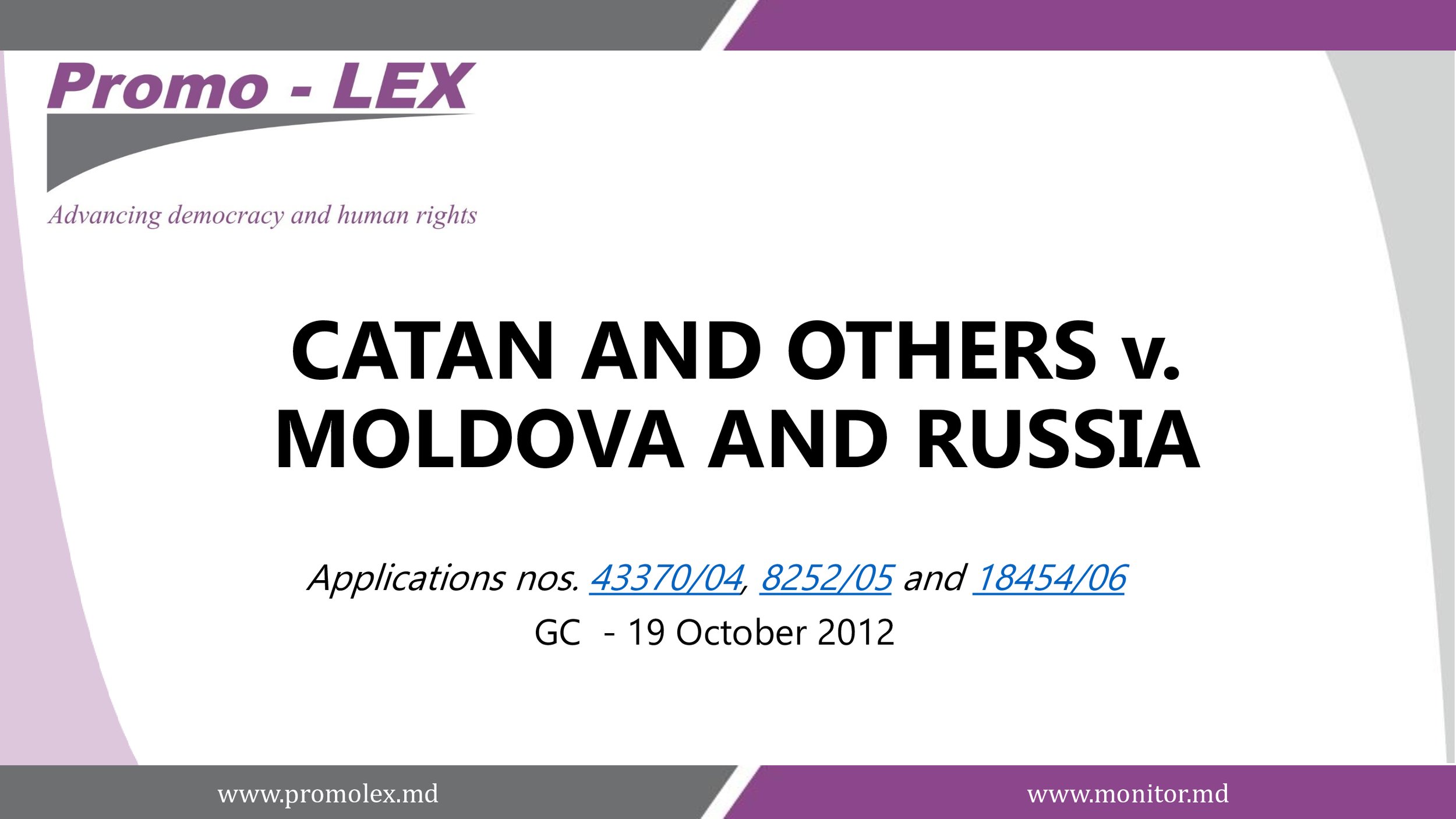
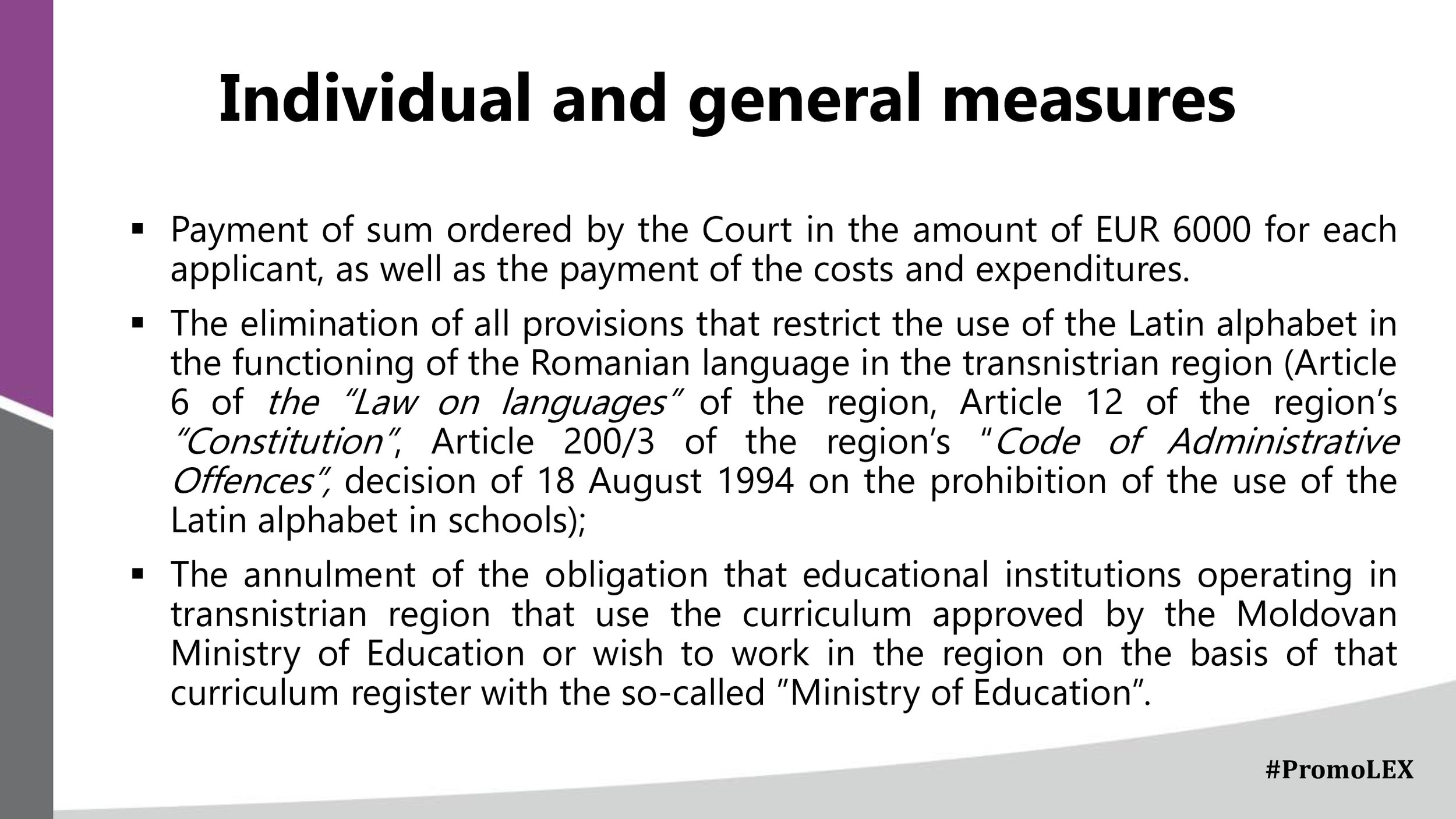
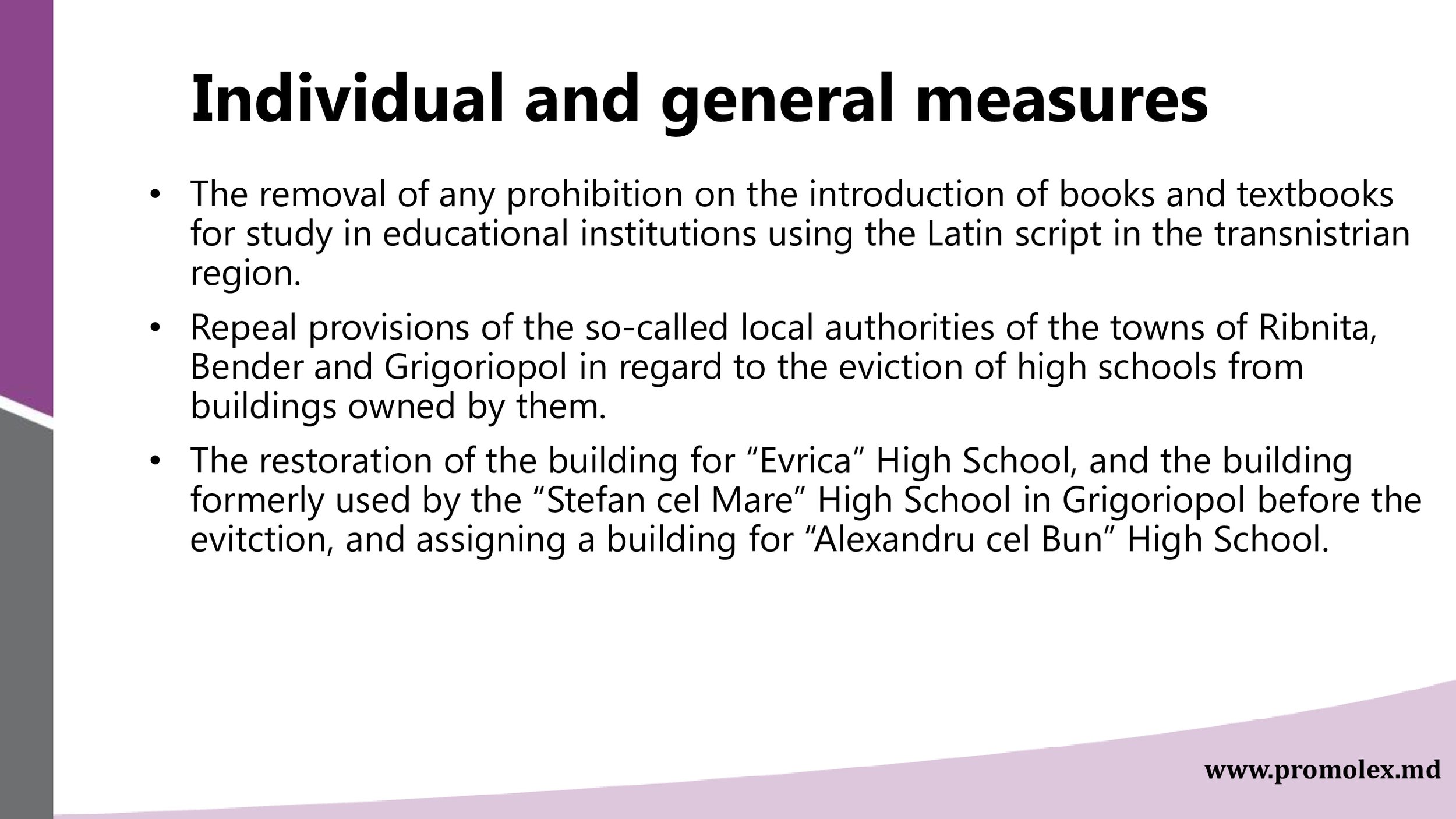
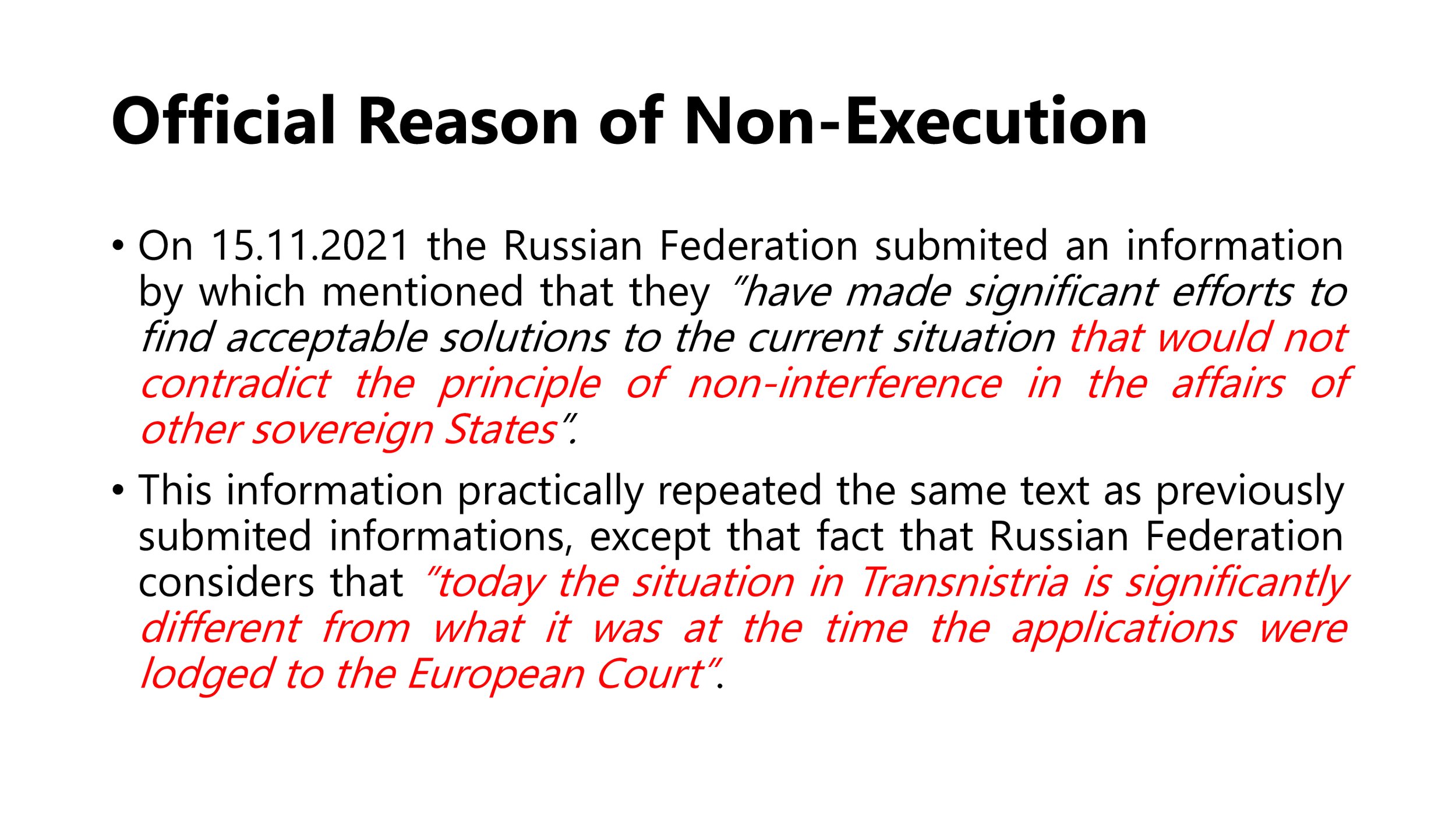
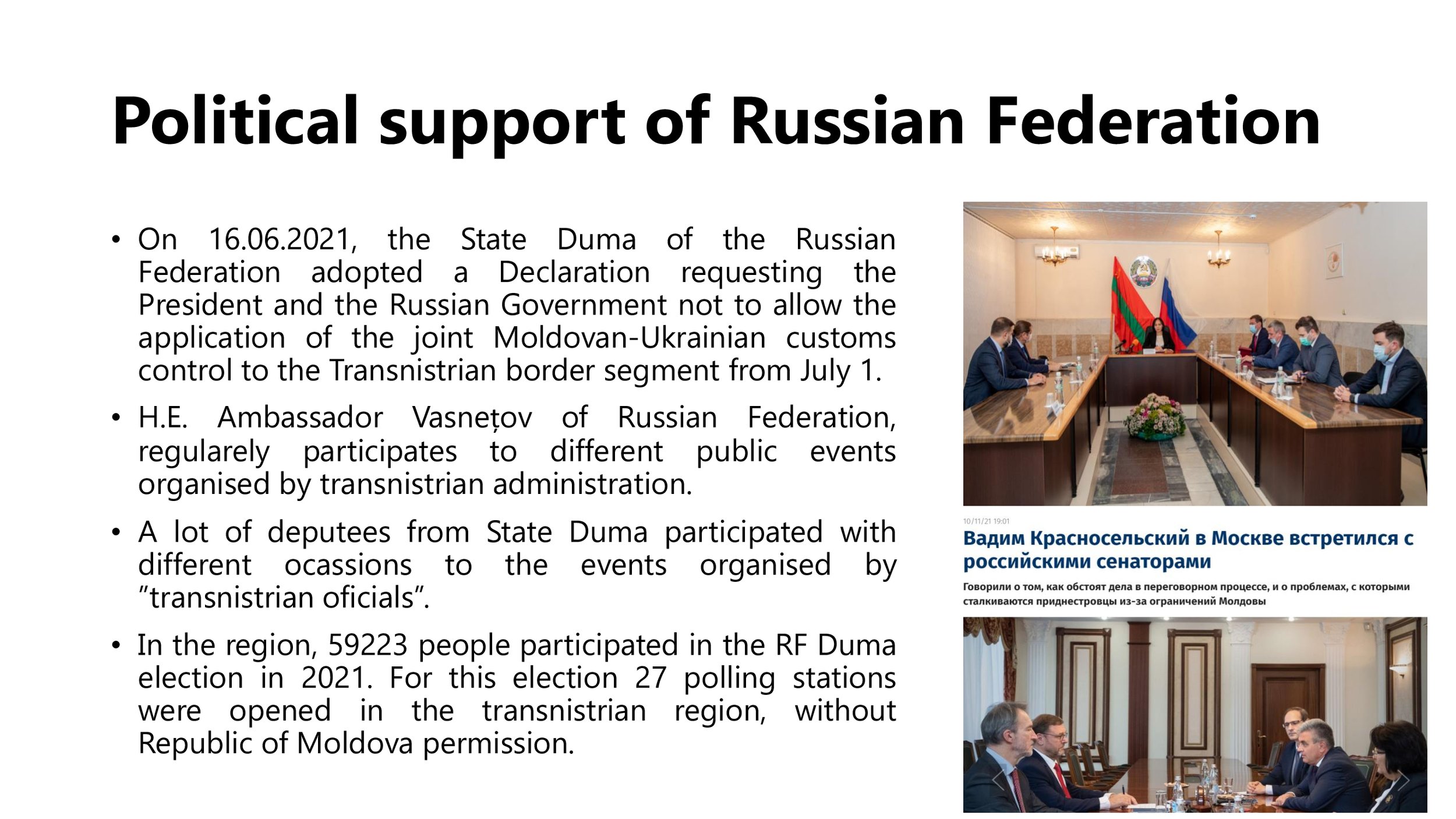
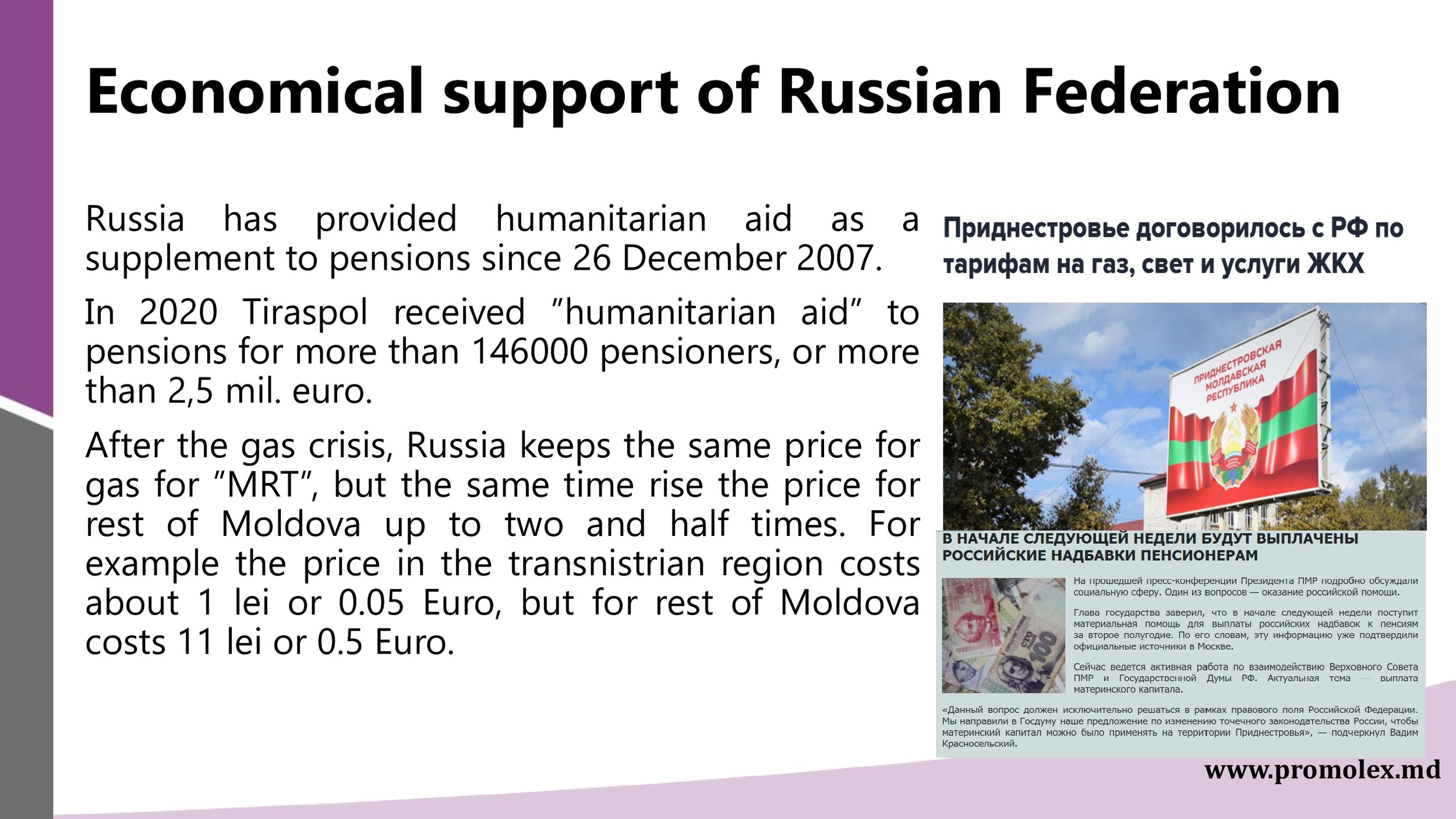
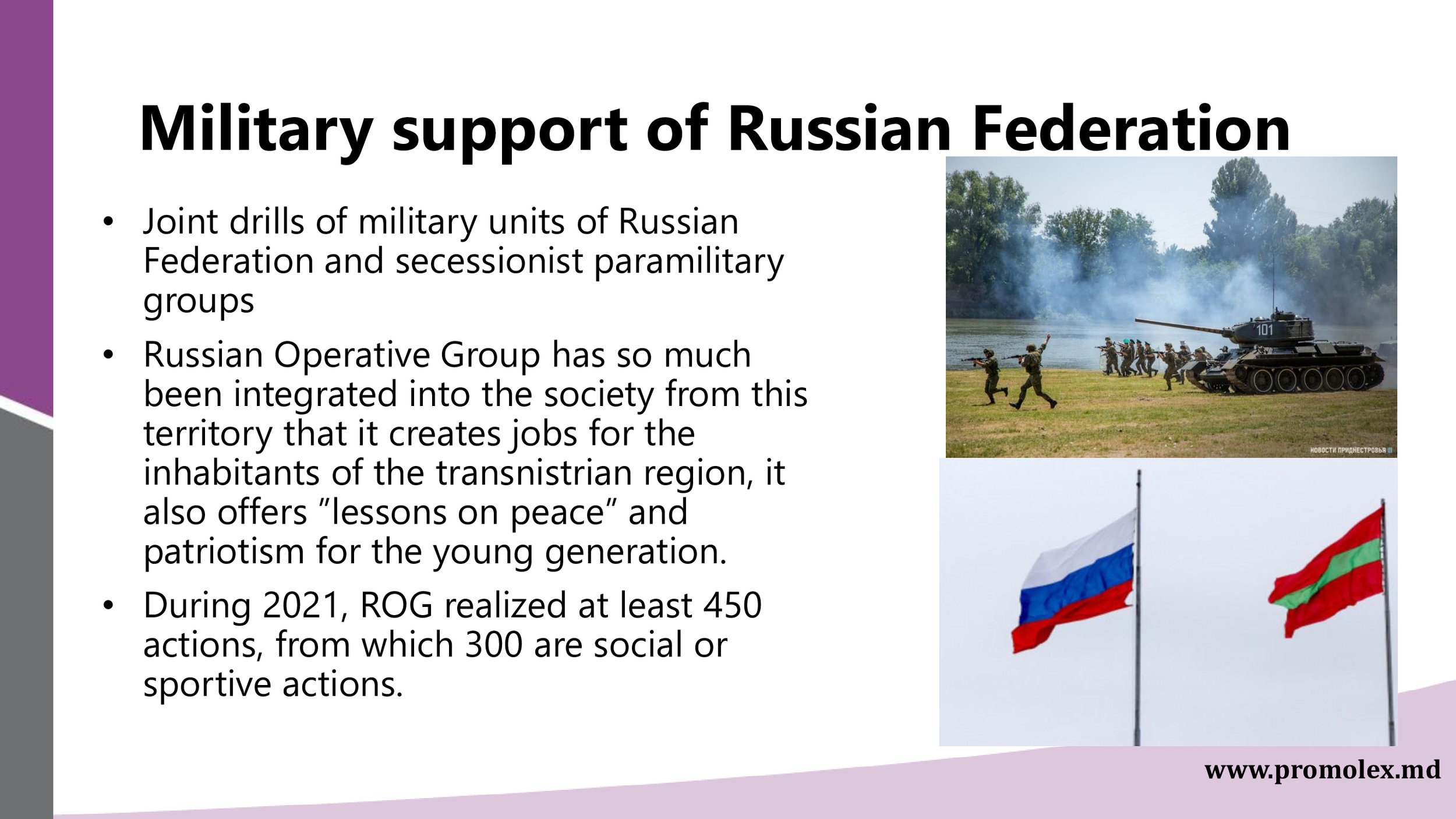
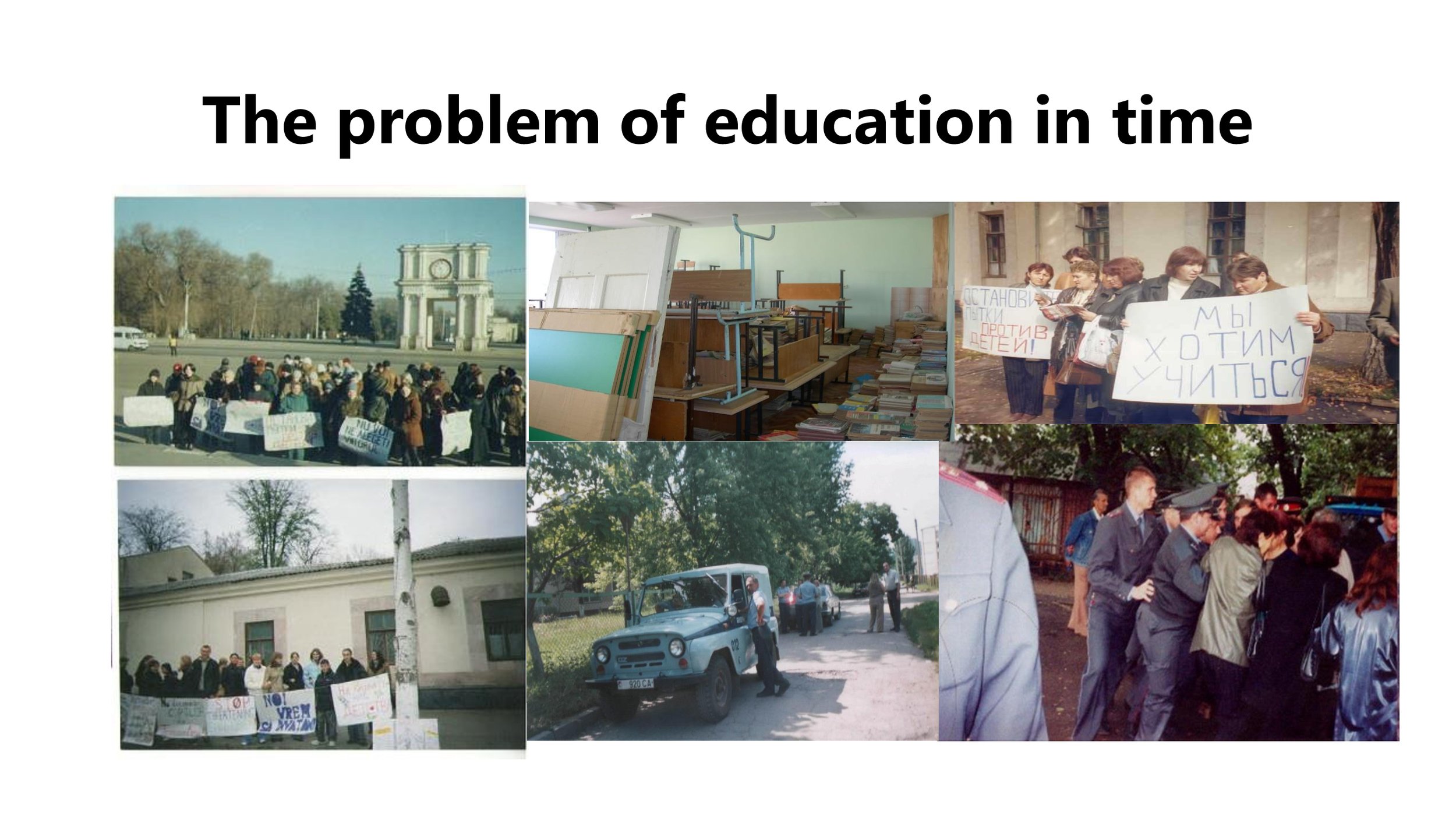
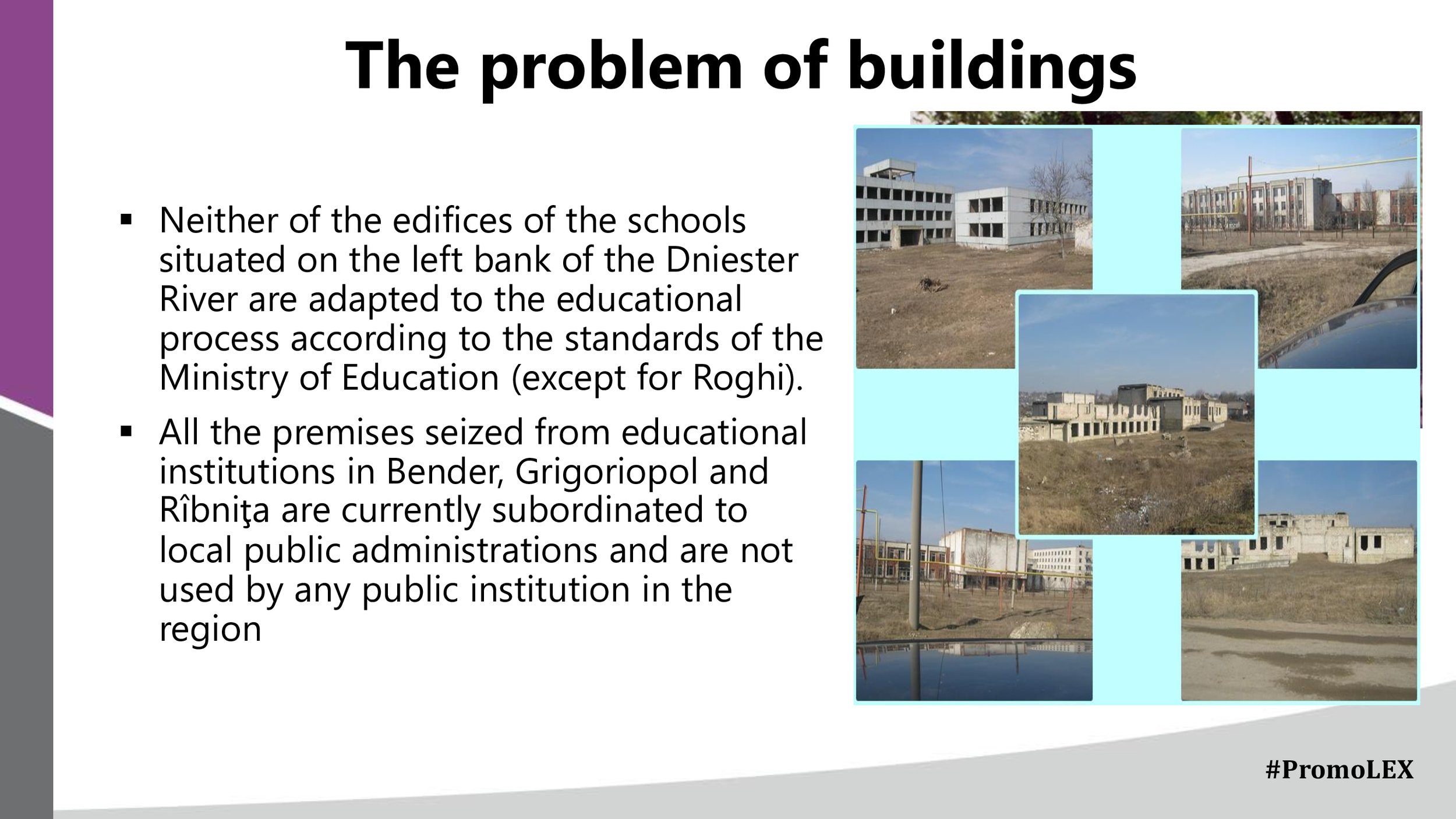
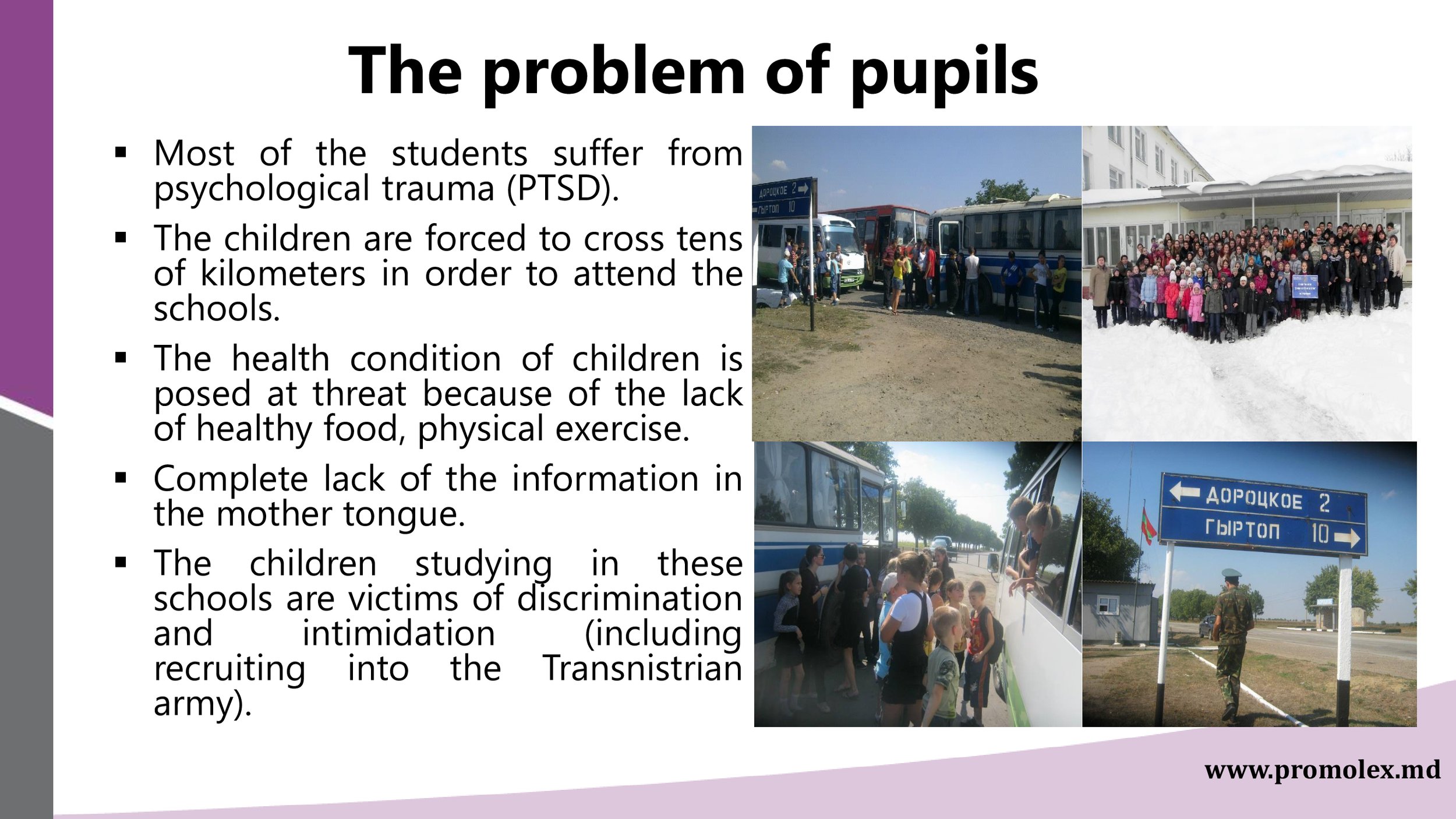
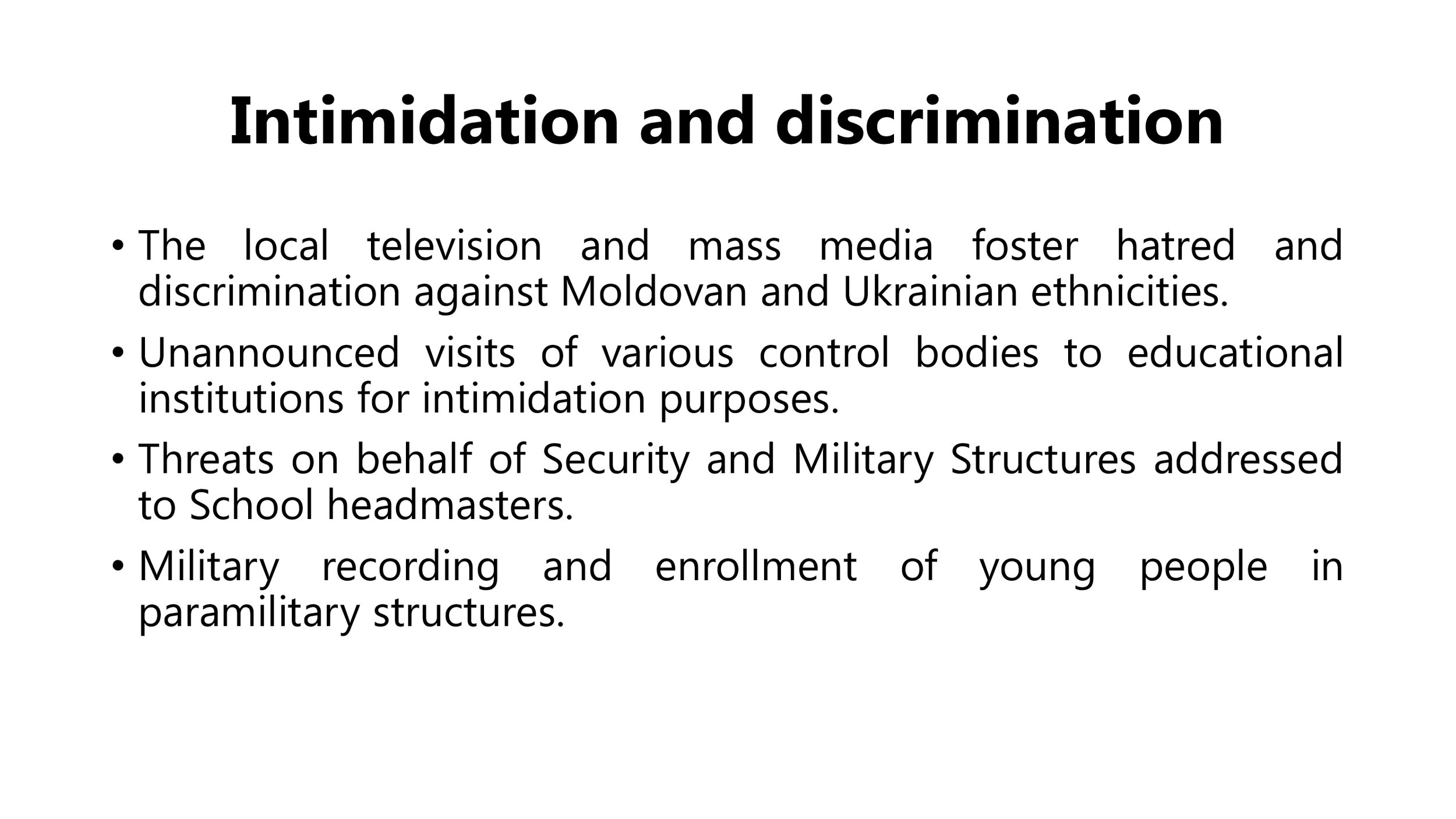
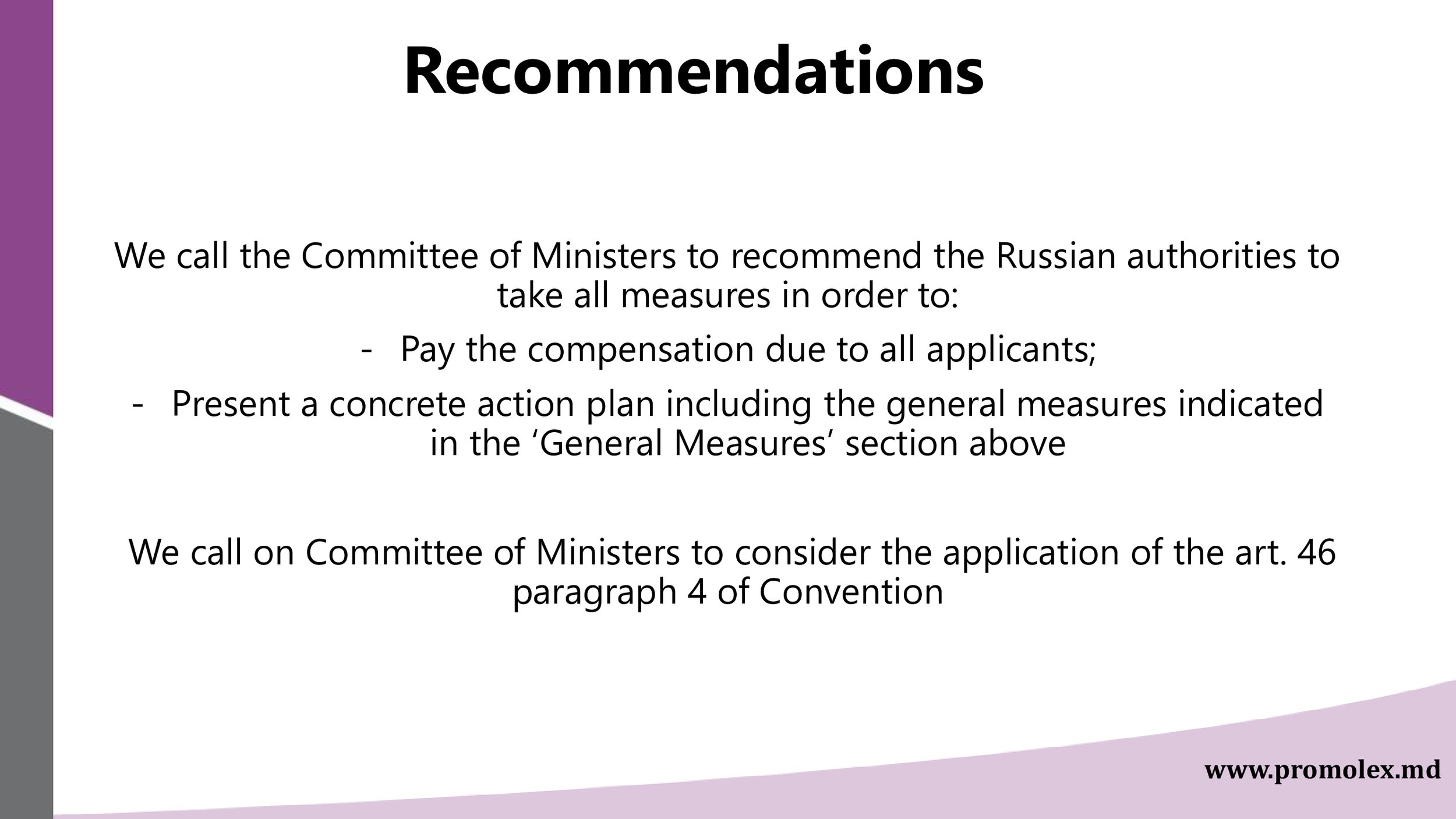

Payment of sum ordered by the Court, as well as the payment of the costs and expenditures.
The elimination of all provisions that restrict the use of the Latin alphabet in the functioning of the Romanian language in the Transnistria region.
The annulment of the obligation that educational institutions operating in the Transnistria region that use the curriculum approved by the Moldovan Ministry of Education or wish to work in the region on the basis of that curriculum register with the so-called “Ministry of Education”.
The removal of any prohibition on the introduction of books and textbooks for study in educational institutions using the Latin script in the Transnistrian region.
Repeal provisions of the so-called local authorities of the towns of Ribnita, Bender and Grigoriopol regarding the eviction of high schools from buildings owned by them.
The restoration of the building for “Evrica” High School, and the building formerly used by the “Stefan cel Mare” High School in Grigoriopol before the eviction and assigning a building for “Alexandru cel Bun” High School.
Promo-LEX outlined the following in regard to the situation in Transnistria:
Political support of Russian Federation
On 16.06.2021, the State Duma of the Russian Federation adopted a Declaration requesting the President and the Russian Government not to allow the application of the joint Moldovan-Ukrainian customs control to the Transnistrian border segment from July 1.
H.E. Ambassador Vasnețov of the Russian Federation regularly participates in different public events organised by Transnistrian administration.
A lot of deputies from State Duma participated in different events organised by “Transnistrian officials”.
In the region, 59223 people participated in the RF Duma election in 2021. For this election, 27 polling stations were opened in the Transnistrian region, without the Republic of Moldova permission.
Economical support of Russian Federation
Russia has provided humanitarian aid as a supplement to pensions since 26 December 2007.
In 2020 Tiraspol received “humanitarian aid” to pensions for more than 146000 pensioners or more than 2,5 mil. euro.
After the gas crisis, Russia keeps the same price for gas for “MRT”, but at the same time raise the price for the rest of Moldova up to two and half times.
Military support of Russian Federation
Joint drills of military units of the Russian Federation and secessionist paramilitary groups.
Russian Operative Group has been so integrated into the society from this territory that it creates jobs for the inhabitants of the Transnistria region, it also offers “lessons on peace” and patriotism for the young generation.
In 2021, ROG realized at least 450 actions, of which 300 are social or sportive actions.
Promo-LEX outlined the problems of education:
The problem of buildings
Neither of the edifices of the schools situated on the left bank of the Dniester River are adapted to the educational process according to the standards of the Ministry of Education (except for Roghi).
All the premises seized from educational institutions in Bender, Grigoriopol and Rîbniţa are currently subordinated to local public administrations and are not used by any public institution in the region.
The problem of pupils
Most of the students suffer from psychological trauma (PTSD).
The children are forced to cross tens of kilometres to attend school.
The health condition of children has been under threat because of the lack of healthy food, physical exercise.
Complete lack of information in the mother tongue.
The children studying in these schools are victims of discrimination and intimidation (including recruiting into the Transnistrian army).
Intimidation and discrimination
The local television and mass media foster hatred and discrimination against Moldovan and Ukrainian ethnicities.
Unannounced visits of various control bodies to educational institutions for intimidation purposes.
Threats on behalf of Security and Military Structures addressed to School headmasters.
Military recording and enrolment of young people in paramilitary structures.
Image Credit: EIN
Promo-LEX provided the following recommendations to the CM urging authorities to:
- Pay the compensation due to all applicants.
- Present a concrete action plan including the general measures indicated in the ‘General Measures’ section above.
Promo-Lex called on the Committee of Ministers to consider the application of the art. 46 paragraph 4 of Convention.
Please see the slides for the full Briefing.
Relevant Documents:
Recent rule 9.2 Submissions
Recent CM Decisions
Overview of Statement on the Liquidation of
the NGOs International Memorial and Human Rights Centre Memorial
Overview of Presentation
On 11 November 2021, the news broke that the Office of the Prosecutor General of the Russian Federation filed a lawsuit to the Supreme Court of the Russian Federation seeking liquidation of one of the oldest Russian NGOs, International Memorial. The reason is the repeated violation of the legislation on "foreign agents". The Human Rights Center is additionally accused of justifying extremist and terrorist activities. The hearing for the liquidation of the International Memorial is scheduled for November 25. The preliminary hearing on the liquidation of the Human Rights Center Memorial is scheduled for November 23.
Over the past decades, the Human Rights Center has dealt with human rights issues in Chechnya, the rights of migrants, supporting political prisoners, defending the rights of Russian citizens in the European Court of Human Rights (ECHR) and has become one of the largest and most respected human rights organizations in the country. Having launched the ECHR program in 2000, Memorial HRC lawyers have since won 140 cases, helping 361 individuals obtain legal redress and secure their rights under the European Convention. To this day, around 250 applications lodged by Memorial HRC lawyers are still pending, including the case of 61 NGOs on the quality of the Russian Foreign Agents Act (Ecodefense and Others v. Russia, application no. 9988/13). If Memorial is eliminated, it would also seriously affect the work on the implementation of the ECHR judgments.
Memorial is undertaking important work both on the domestic and international level related to the implementation of individual and general measures related to the ECHR judgments. Memorial prepared the submissions to the Committee of Ministers related to the general measures of implementation in Lashmankin’s group of cases (various systemic problems related to the right to freedom of assembly in Russia), in Khashiyev’s group of cases (serious violations of the right to life during the security and antiterrorist operations in the North Caucasus’s region of Russia), in Kim’s group of cases (violations of the rights of statelessness persons in Russia) and in other groups of cases. Several requests to the national institutions have also been made in these cases proposing the changes into the laws and other general measures of implementation.
If Memorial is liquidated its former lawyers would not be able to make submissions to the Committee of Ministers on the general measures of implementation, and the the practice of non-implementation of the ECtHR judgments by the Russian authorities can further aggravate.
The liquidation of the International Memorial and Human Rights Center Memorial is not just the suspension of the activities of these organizations, which help thousands and tens of thousands of people. The Memorial is primarily a symbol of Russian civil society, and that is why the state seeks to destroy it. This is a clear message to all civil society and non-profit organizations.
On behalf of the Memorial NGOs, Dmitry Gurin, Senior Lawyer with Memorial Human Rights Centre (ECtHR litigation practice), called upon the Committee of Ministers to take a firm stance against the liquidation of International Memorial and Human Rights Center Memorial and to raise this issue through their diplomatic channels.

